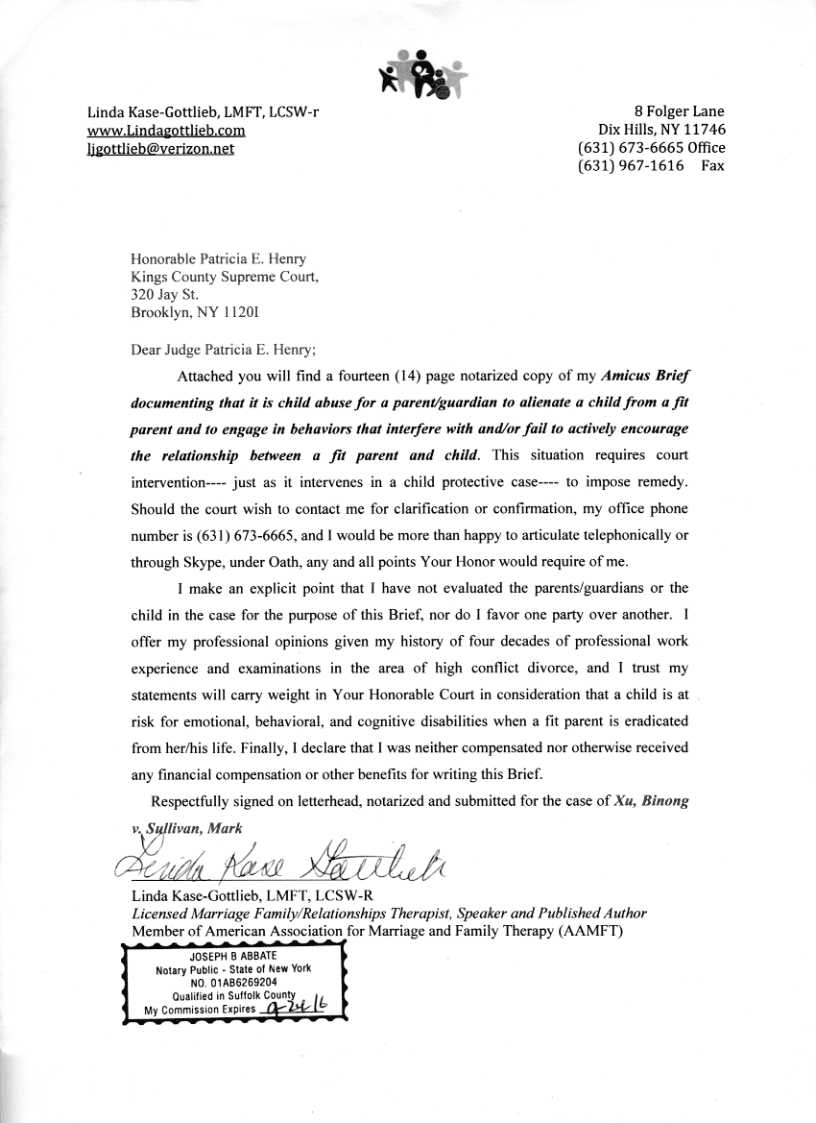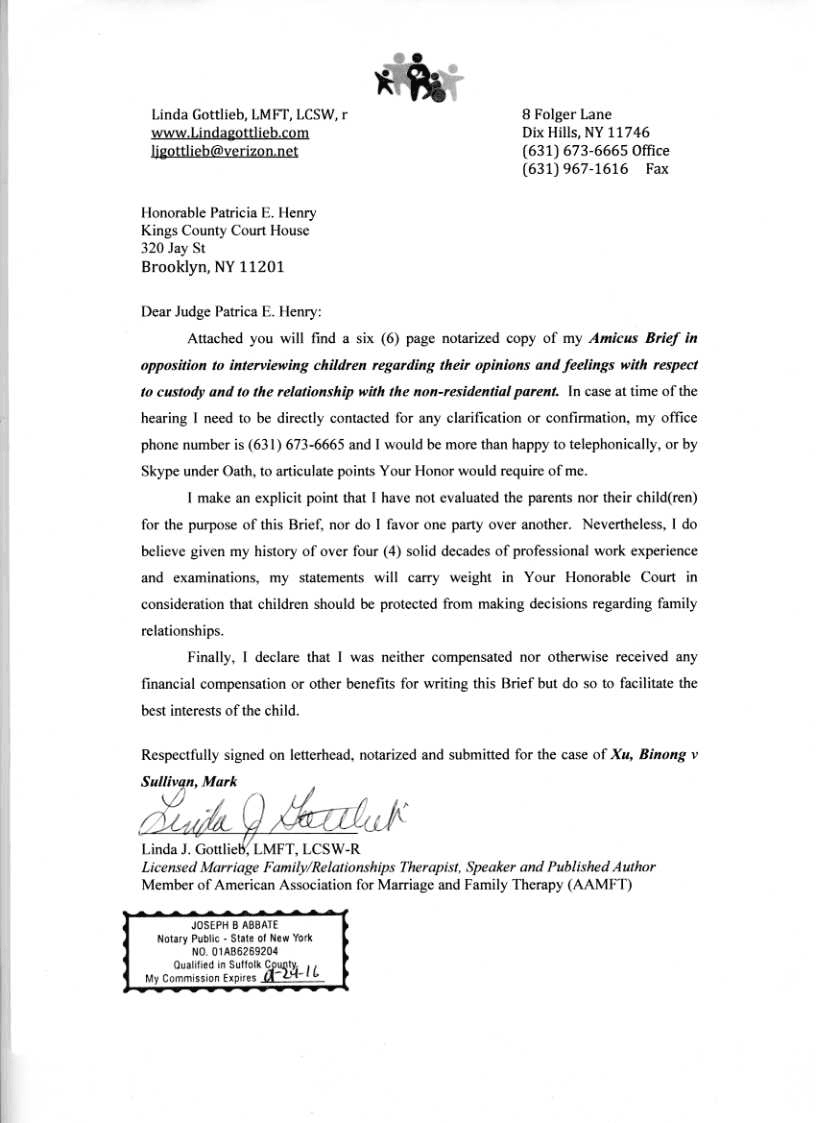How Elizabeth became fatherless ______ Experts etc.
Clinical Forensic Initiatives Visit Report (03/2011)
Affidavit Attorney Findley NCMEC
Amicus Brief Documenting Child Abuse
Amicus Brief in Opposition to Interviewing Child
On Appeal to the Kings County IDV Court
March 30, 2011
Honorable Judge Patricia E. Henry
Kings County Supreme Court
330 Jay Street
Brooklyn, NY 11201
Case: Binong Xu Vs. Mark Sullivan
Docket Number: V-01013-06, V-01014-06, O-01012-06
Parents: Mother: Binong Xu
Father: Mark Sullivan
Child: Elizabeth Mei-Xu Sullivan, DOB: 10/21/04
Re: Supervised Visitation ordered on September 20, 2010
Dear Honorable Judge Henry,
Please find the following report on the above-mentioned case after completion of fourteen office-based supervised visits between Mr. Sullivan and his biological daughter Elizabeth Sullivan, age 6, conducted for one hour on Saturdays from 12/4/10 to 3/26/11.
I. Summary of Supervised Visits
1. December 4, 2010
Elizabeth arrived for the first visit with Mr. Sullivan in nearly 8 months, and appeared very happy to see Mr. Sullivan. She threw her arms around his neck, hugged him, and in return, Mr. Sullivan gave Elizabeth a Dora the Explorer gift and acknowledged she had turned six since the last time he had seen her. Mr. Sullivan asked about school, and she told him how she was promoted to first grade from kindergarten, and attends an afterschool program where other children are not nice to her. She showed him how she lost a tooth. He made a joke about the Chinese calendar and how it was the “Year of the Chicken Dumpling.” Elizabeth laughed. He gave her additional holiday presents including toy hamsters. They shared memories of Elizabeth’s childhood, and Mr. Sullivan read to Elizabeth from a book of fairy tales. Mr. Sullivan engaged Elizabeth in a conversation about the Disney Channel, and High School Musical. Elizabeth told Mr. Sullivan while playing game, “Daddy—I miss you”, displayed a lot of affection, and hugged him throughout the visit. She asked to play “Horsey” and to ride around on Mr. Sullivan’s back. Elizabeth and Mr. Sullivan swapped jokes typically enjoyed by children and considered “toilet humor.” When the end of the visit neared, Elizabeth asked to play the game “Trouble” during the next visit. Mr. Sullivan agreed and asked Elizabeth about her clothing and shoe sizes so he might pick up additional items for Elizabeth to give to her at the next visit.
Impressions: Elizabeth had not seen Mr. Sullivan in eight months. SW observed Elizabeth appeared to be very happy to see Mr. Sullivan. She expressed age appropriate affection and a level of both comfort and familiarity during the visit, evident in Elizabeth’s playful exchange of conversation, jokes and “toilet humor” with Mr. Sullivan. They spoke openly about shared memories of the past, and displayed a secure parent/child attachment. Generally speaking, when a child’s attachment to a parent is secure, the bond provides a stable foundation for the child’s healthy growth and development. Elizabeth, towards the end of the visit, told Mr. Sullivan that she misses him and requested to plan ahead for activities at the next visit. Her request suggests Elizabeth is in need of assurance from Mr. Sullivan that she will in fact see him again versus go for another extended period of time without contact with Mr. Sullivan. There were two periods in the past that lasted approximately 8 months each during which Elizabeth did not have weekly contact with Mr. Sullivan because of court related interference. It is apparent from SW’s observations that she looks forward to and enjoys time with Mr. Sullivan, and he is attuned to Elizabeth’s age related interests and appropriate need for parental attention.
2. December 11, 2010
Elizabeth arrived, went to Mr. Sullivan, put her arms around his neck and hugged him closely. He gave her small boxes of chewing gum. He asked questions about her activities at school and involvement with dance class. She told him about taking part in the rehearsal for a Nutcracker performance and sat comfortably in his lap throughout the visit. They talked about memories of playing games when Elizabeth was 5 ½ years old. Mr. Sullivan asked about DVDs that Elizabeth watches including Winnie the Poo, Rocket, Little Einstein, and Dora the Explorer, about her friends Ziggy and Nikki, plus what Elizabeth eats for breakfast at school. Elizabeth showed Mr. Sullivan her tooth filling after eating too much candy. They talked about ice-skating, and Elizabeth teased Mr. Sullivan about his “yellow teeth” and playfully used a Memory Game butterfly card to “kiss” Mr. Sullivan on the cheek. She said, “He’s smiling and wants to kiss you.” Mr. Sullivan reminded Elizabeth about a time when she bit her tongue on the table and she agreed she remembered. Mr. Sullivan told about the day Elizabeth was born, and she hugged Mr. Sullivan while he told the story of her birth. Elizabeth asked him to tell stories about when she was a baby and whether or not Mr. Sullivan understood “baby talk.” Elizabeth located a Memory card with an image of a bird and playfully said, “Wait—birdy—pip—pip—tweet, tweet. It says, “I love you!” Mr. Sullivan told Elizabeth, “I love you too!” Elizabeth pretended there was a “birdy family” with a dad and mom. Mr. Sullivan and Elizabeth challenged each other with multiplication tables, and he expressed feeling proud of her math ability. Elizabeth playfully put a piece of chewed gum on Mr. Sullivan’s forehead, laughed, and asked Mr. Sullivan about her 6th birthday present and suggested he “never gave” her a present. [Mr. Sullivan has not been allowed to attend Elizabeth’s birthdays following her first birthday because of court restrictions related to Ms. Xu’s allegations of a past history of domestic violence.] When SW told Mr. Sullivan and Elizabeth there were only five minutes left for the visit, Elizabeth teasingly told Mr. Sullivan he had bad breath. He said he would try to drink less coffee. Elizabeth unexpectedly put a plastic bag over her head. Mr. Sullivan responded with genuine concern and said, “Heh, heh—don’t do that—don’t you ever do that.” Elizabeth said she was “just being funny.” He told her not to be “funny like that anymore” and made a joke that Elizabeth is a “sweetheart” and “funny looking.” When it was time to leave, Elizabeth asked to watch another Little Einstein video. Mr. Sullivan gently explained it was time to go. She jokingly put another piece of chewed gum on his cheek, and then Mass arrived to pick up Elizabeth for the transfer to Ms. Xu.
Impressions: Elizabeth and Mr. Sullivan have a strong and affectionate bond rooted in Elizabeth’s early developmental years (0-2) when Mr. Sullivan was very involved in her day-to-day care. Despite the two respective 8-month periods of no contact between Mr. Sullivan and Elizabeth during the past four and a half years, Elizabeth displayed a healthy level of physical affection towards Mr. Sullivan and told him on several occasions that she loves him and misses him. Towards the end of the visit, Elizabeth experienced difficulty with saying goodbye to Mr. Sullivan, preferring to watch another Little Einstein video instead. Elizabeth then engaged in negative attention seeking behavior when she unexpectedly put a plastic bag over her head. Although Elizabeth said she was “just being funny” her behavior suggests Elizabeth feels abandoned by Mr. Sullivan who, for example, has not attended any of her birthday parties since she turned one year old and has largely been absent from her day-to-day life. Latency-age children will frequently blame themselves when parents do not meet their healthy needs for attention and affection, and can develop a sense of shame that they are somehow defective. The theme of Elizabeth’s play has included intact families where there is “a mommy and a daddy.” It appears that she continues to suffer the loss of the intact family with both Ms. Xu and Mr. Sullivan.
3. December 18, 2010
Elizabeth arrived ten minutes late. She wore jeans and a ballet tutu, went to Mr. Sullivan and hugged him warmly. He told her she looked pretty, and he asked about her dance show and how many people were there in the audience. Mr. Sullivan told Elizabeth he had movies to watch and offered her a choice. Elizabeth displayed enthusiasm when the narrator of the movie Missing Invitation mentioned China. Mr. Sullivan discussed with Elizabeth cultural references to China and also Paris and impressionistic art. They lay on the floor together with elbows propped while watching movies. Mr. Sullivan pointed out the UN in New York City, talked about a time when Elizabeth visited a farm and milked cows, and asked if she ever used her Look N’ Listen game. Elizabeth affectionately began crawling over Mr. Sullivan until she looked directly into his eyes, face-to-face, and showed him her loose tooth. They laughed and talked about how Elizabeth speaks English and Chinese—“Chinglish.” Mr. Sullivan asked about Elizabeth’s knowledge of Chinese language and she reminded Mr. Sullivan she was born in China, chewed gum and tried to feed chewed gum to Mr. Sullivan. She stuck her tongue out, with chewed piece of gum balanced on the tip of her tongue, and then spit the gum into a small box. Elizabeth cuddled with Mr. Sullivan on the floor, and he asked if she liked the song, “Ode to Joy.” He showed Elizabeth a photo of her posted at his home on the refrigerator and said everyday he says to the photo, “Hi Elizabeth!” Mr. Sullivan read out loud from a book of fairy tales. Elizabeth looked at the other movie titles, and said she remembered a song from one of them. Mr. Sullivan reminded her she used to watch the movies when she was 2,3,4, and 5 years old. Elizabeth crawled on top of Mr. Sullivan, wrapped her arms around his neck, then leaned down and kissed Mr. Sullivan on the cheek. While pressing her cheek against Mr. Sullivan’s cheek, she let out a loud belch. He asked if she was OK, and Elizabeth again fed Mr. Sullivan pieces of gum. She held Mr. Sullivan’s cheeks in her hands and squeezed them in a silly manner, and squished his face. In response, Mr. Sullivan made a funny noise. She took off her sweater and wrapped her arms around his neck, and remained affectionately cuddled with Mr. Sullivan while together they watched movies. Elizabeth asked about her “mommy and daddy” while scrolling through images in Mr. Sullivan’s computer. She playfully acted like she was falling off of Mr. Sullivan, and said, “I am falling!” Mr. Sullivan tickled Elizabeth, she laughed, and he asked her about the ticklishness of her ear, nose and head. She wanted to play horsey one last time before the end of the visit. Mr. Sullivan told her that the time was up and helped her to put her sweater back on. Then Mass arrived and escorted Elizabeth back to Ms. Xu.
Impressions: Elizabeth on several occasions wanted Mr. Sullivan’s full attention, for example, when she held his face in her hands and asked for him to look at her loose tooth. Child has verbalized a strong identification with Chinese culture and Mr. Sullivan has engaged in discussions with Elizabeth about her bi-cultural background, for example, when he joked that child speaks “Chinglish.” Elizabeth openly displays love and affection for Mr. Sullivan, and the theme of her play is often an intact family where there is both a “mommy and daddy.” For the first two years of her life, she lived with Ms. Xu and Mr. Sullivan—and together, the family was intact. Following the separation, Elizabeth has experienced damage in response to the prolonged conflict and lack of resolution between her parents.
4. January 8, 2011
Elizabeth arrived for the visit and Mr. Sullivan surprised Elizabeth with Christmas gifts. He gave her a Leapster II game with rechargeable batteries, several books including stories from around the world, and also a new battery operated hamster named Mr. Squiggles. Together, they played with the hamster and Leapster. Mr. Sullivan told Elizabeth he made her a Christmas card. She put her arms around Mr. Sullivan, hugged and kissed him on the cheek in response. Elizabeth told Mr. Sullivan how to play the game, and he helped her spell Ms. Xu’s name, and also his own, for the game. He told her stories about her early childhood in China while they colored images. Elizabeth sat affectionately with Mr. Sullivan while they drew together, side-by-side. Elizabeth colored a rainbow image, and began to talk in a baby voice. She scrolled through different animated images and Mr. Sullivan pointed out the game was “like a cartoon.” Mr. Sullivan gave Elizabeth a pair of headsets, which she said were too big for her ears. Elizabeth asked Mr. Sullivan if he had a Christmas tree at home and he told her about his Evergreen. She told him she wanted to make a drawing for him and drew a picture of the sun, and said, “That’s the sun—I want there to be a rainbow bridge.” She wanted “the bridge to reach the sky.” Mr. Sullivan showed Elizabeth how to save the drawing, leaned down and gave her a kiss on the forehead. Elizabeth joked that the sunlight had come out and tornadoes were gone. She pointed out images of fairies and shooting stars. Mr. Sullivan then showed her slides of photos he took in China and held them up against the light for Elizabeth to see. He pointed out the photos were of, “All the buildings in China” and Elizabeth remarked that the room was getting hot and so SW went to open the window. Elizabeth unwrapped the gift pack of jelly-band bracelets, and Mr. Sullivan showed Elizabeth how to scroll through the Leapster images. Elizabeth stopped him while he drew a picture and said, “Save it! It will remind me of you. Save your picture, because I really love it.” Mr. Sullivan then told Elizabeth it was time for the visit to end, and she replied she was too busy to go. She kept playing, and Mr. Sullivan reminded her it was time to clean up. Elizabeth hugged and kissed Mr. Sullivan before returning to meet Ms. Xu.
Impressions: Elizabeth, in her attempt to remember Mr. Sullivan between visits, asked him to draw a picture to remind her of him. In return, Elizabeth drew a picture of a sun for Mr. Sullivan—an image of light, creativity and spirituality, and a bridge that reaches the sky—symbolic of Elizabeth’s hope for the future and also Mr. Sullivan’s capacity to respond to the spiritual and creative core of Elizabeth. According to Linda Gunsberg, Ph.D., author of the essay The Forensic Expert’s Challenge Making Recommendations In the Best Interests of Children, she writes about how Elaine Swager, Ph.D. “makes a plea for assessing the parent’s capacity to respond to the spiritual and creative aspects of the child when the court is making child custody decisions.” In Elizabeth’s creative expression during this visit, she described a scene where the “tornadoes” were gone, indicative of a time in the past filled with stormy emotions. When Elizabeth’s parents first separated in 2006, she cried a lot, according to Mr. Sullivan, and would calm down when Ms. Xu put Elizabeth on the phone with Mr. Sullivan. When Elizabeth, or any child, talks in an infantile voice, the behavior can be indicative of the child holding onto being the baby a complete family unit.
5. January 15, 2011
Elizabeth arrived at the visit, put her arms around Mr. Sullivan’s neck and hugged him. She showed Mr. Sullivan how she again lost a tooth. He asked about her week, and gave her candy and juice. She teased that Ms. Xu does not allow her to eat candy and agreed to eat candy only during visits with Mr. Sullivan. Elizabeth told Mr. Sullivan about how she took a trip to Disneyworld during the holiday vacation. Mr. Sullivan told Elizabeth about the blizzard in New York City and how he shoveled the walkways near his home. Mr. Sullivan provided Elizabeth art paper and pastels, and showed her how to smudge pastels on the paper. He explained how the image he made for her resembled a Monet painting and the impressionists. Elizabeth again hugged him in response. He asked about her asthma, and if she had been to a doctor. Mr. Sullivan reminded Elizabeth that Ms. Xu grew up in a warm climate in China. Elizabeth then said, “It was nighttime when I came back to America. Oh—I went to Florida.” Mr. Sullivan looked confused and told Elizabeth, “Florida is in America” and reminded Elizabeth that Florida is in the US, and not another country. He told her that when she was a baby, she flew “all the way from China” and that he had pictures from when she was an infant. Elizabeth hugged and kissed Mr. Sullivan on the cheek, and asked him to tell her the story of The Little Rabbit. He that when she was born, she was zero, and every year after has been a celebration of her birth and Elizabeth is now six years old. He told her how her ancestors came from Norway. Mr. Sullivan offered to draw her a picture, and suggested she draw one for him. He asked about words in Chinese that Elizabeth knows including meaning of Ms. Xu’s name, Binong, and told her Ms. Xu’s first name means “beautiful.” He told Elizabeth that she has two names—one Chinese and another American. She told Mr. Sullivan that his sister Marilyn has a boyfriend and asked him to tell her the story of the Monkey King. Mr. Sullivan asked if she knew about the Dragon Boat Carnival—and how it takes place in China and also in the US each year. Elizabeth talked about school and how her class watched the film, “Journey to the Center of the Earth.” Elizabeth sneezed and Mr. Sullivan offered her tissues. She told him how her glasses were scratched when another student bumped into her at the drinking fountain. They spoke about the Chinese calendar, and she asked when it was going to be “The Year of the Monkey.” He told her, “In six years—when you are twelve years old.” Elizabeth made smacking sounds, and said, in a playful manner, “I am hitting my tushie—I am hitting it now” and made patting gestures on her buttucks. Mr. Sullivan asked, “why?" and she said, “It just needs to be hit.” Mr. Sullivan responded, “I am going to make you a picture.” She told him how sometimes she goes ice-skating with Ms. Xu, and then to McDonalds. They continued to draw pictures together, and Elizabeth wrapped a drawing around Mr. Sullivan’s neck. She said, “Horsey ride” and Mr. Sullivan crawled on his hands and knees while Elizabeth rode Mr. Sullivan like a horse around the room. He showed Elizabeth how to make paper planes to “send messages.” They talked in babble talk and Mr. Sullivan imaginatively called it, “Saturnese.” She said, “blah, blah, blah” and Mr. Sullivan pretended to translate the language for Elizabeth. It was then time for the visit to end. Mr. Sullivan suggested that Elizabeth, when looking at the moon, remember Mr. Sullivan and think of drawings they made for each other. They hugged and said goodbye.
Impressions: Elizabeth mentioned how it was “nighttime” when she “came back to America” and Mr. Sullivan clarified for Elizabeth that Florida is in America, and not another country. It appears that Ms. Xu has been talking with Elizabeth about going back and forth between China and the US. Mr. Sullivan has expressed he is worried that Ms. Xu might take Elizabeth back to China and not return. He claims when Ms. Xu arrived in the US for the first time in 2005, she experienced a tremendous amount of culture shock and became depressed as a result. There are no restrictions to prevent Ms. Xu from returning to China with Elizabeth. Mr. Sullivan has been making an effort to educate Elizabeth about both Chinese and Irish-Catholic heritage on both Ms. Xu’s and Mr. Sullivan’s sides of the family. It is significant that Mr. Sullivan engages in very positive talk with Elizabeth about Ms. Xu, and also her grandparents. When Elizabeth began “hitting” her “tushie,” she seemed engaged in age appropriate play initiated by Elizabeth and not by Mr. Sullivan. She giggled while patting heself on the bottom. Young children often engage in spanking games, for example, play “house” and spank each other, which is normalized developmental play.
6. January 22, 2011
Elizabeth arrived, happily went to Mr. Sullivan, put her arms around his neck. Together, they displayed mutual affection. Mr. Sullivan gave Elizabeth a drawing of “Mr. Moon” and reminded her that he thinks about her throughout the week. He gave Elizabeth snacks (packets of oatmeal to take home, Panda candy) and paper and oil pastels for an activity during the visit. The two lay on the floor, elbows propped, side-by-side, and colored. Mr. Sullivan asked about Elizabeth’s lost tooth, school, and told her about ice-skating. Together, they created a drawing of a rainbow. Mr. Sullivan shared with Elizabeth stories of when she was born in China and how nurses cared for her as an infant. Elizabeth asked about “the red blanket” that Ms. Xu used to wrap her in. He told her a story about how her parents went in search of the “special blanket” and had one made by a local tailor. Elizabeth colored with a red oil pastel while Mr. Sullivan told the story. She switched topics, and told Mr. Sullivan she learned there is a place called Mexico in China and asked about the location of Florida where she recently visited. While listening to Mr. Sullivan, who began to tell Elizabeth about his work as a photographer and how he is putting together a book of photos from China, Elizabeth chewed a piece of gum and placed it on his cheek and pinched his cheeks with her fingers. She put the gum on his forehead, and he laughed in response. Elizabeth sipped the hot cocoa Mr. Sullivan provided at the start of the visit, and slid around on the couch. Mr. Sullivan told Elizabeth about how his grandmother used to make him oatmeal for breakfast and asked about what she eats for breakfast each day. Elizabeth jumped up from the couch and said, “Huggy!” Mr. Sullivan responded, “I’ll give you a hug anytime you want one.” Elizabeth then asked to play “Horsey” and crawled on top of Mr. Sullivan’s back to ride around the room. Elizabeth slid off of his back, giggled, and together they sat and looked at the framed painting in the office and talked about how it looked like a Monet. Elizabeth began to color again with dark blue and purple. Mr. Sullivan pointed out to Elizabeth that when pastels are mixed, the color can become “muddy” and Elizabeth said, “Now I have to go over this—to make it a little muddier—the darkest rain cloud!” Although Mr. Sullivan suggested that soon, the flowers would come out, Elizabeth said, “You need a dark, dark cloud—like a scary dream! You color that after I color this.” Mr. Sullivan drew a “bright sunny one” and Elizabeth said, “This is a dark puddle one.” Elizabeth’s hands were covered in blue and purple pastel, and SW offered to wash Elizabeth’s hands before returning to meet Ms. Xu. Elizabeth drew a picture for Mr. Sullivan before the end of the visit of her pet cat from China, named Tucker. Mr. Sullivan reminded Elizabeth that if she has not seen Tucker for a long time (his sister Marilyn takes care of “Tucker”), the cat might scratch her. She responded that since she does not see Tucker “fat boy” much, he forgets about Elizabeth and explained this was the reason why she was giving Mr. Sullivan a drawing of her cat. Elizabeth said, “He is like a fat boy in this picture.” Mr. Sullivan responded, “I will never forget you” and Elizabeth agreed, “I will never forget you.” Elizabeth reminded Mr. Sullivan that for the next visit, time would be changed because of her dance performance. Mr. Sullivan and Elizabeth hugged and said goodbye.
Impressions: While initially Elizabeth and Mr. Sullivan worked on drawing a rainbow, full of colors and joy, Elizabeth then drew “a dark, dark cloud—like a scary dream.” Elizabeth tried to tell Mr. Sullivan “there is a place called Mexico in China.” So it is apparent that Elizabeth is thinking a lot about other countries, like China and Mexico, and how far away places like China are from the US, and also Mr. Sullivan. During the visit, she frequently hugged Mr. Sullivan and the majority of the time, sat closely with him in a manner considered somewhat clingy. While drawing, she expressed she believes her cat Tucker “forgets” about her, and likewise, in the same respect, is likely afraid that Mr. Sullivan “forgets” about Elizabeth between visits. Mr. Sullivan, in an empathic manner, responded to Elizabeth’s verbal cue, and said, “I will never forget you.” She responded back, “I will never forget you.” It is very frightening for a child to think he or she might never see a parent again. In the past four and a half years, Elizabeth has experienced extended periods of separation from Mr. Sullivan, ergo Elizabeth’s drawing was “like a scary dream.”
7. January 29, 2011
Elizabeth ran to Mr. Sullivan and put her arms around his neck and sat in his lap. He greeted Elizabeth and asked about her dance performance. She told him it was “almost like a show” except “there were only parents around.” Elizabeth asked Mr. Sullivan if he brought her hot cocoa, and he told her, “If you ever want something, just ask for it, OK?” Elizabeth responded, “Even if I go to China?” She told Mr. Sullivan that Ms. Xu plans to take her to China when she gets “a whole lot of money.” Mr. Sullivan turned to SW with a look of worry in his eyes although did not let Elizabeth see his concern. Mr. Sullivan switched topics and told Elizabeth he brought his computer with lots of photos to show her. Elizabeth crossed her leg over Mr. Sullivan’s leg and sat close to him while he set-up his computer. He gave Elizabeth hot cocoa and she enthusiastically told Mr. Sullivan she wanted to see photos of her mother and Tucker, the cat, when her mother first brought Tucker home. Mr. Sullivan told Elizabeth that he was there when Ms. Xu first brought Tucker home, and Elizabeth responded, “Oh God!” Mr. Sullivan showed Elizabeth a picture of the red blanket she was wrapped in as a baby and also a photo of Elizabeth’s mother Ms. Xu, and grandmother. Elizabeth said that she missed her grandmother. Mr. Sullivan told Elizabeth a story of how they moved to America in 2005—and showed her a photo taken with Elizabeth when she was a baby. Elizabeth responded, “When I am in China, I am going to have my hair cut short—because it is hot there.” Mr. Sullivan asked Elizabeth how long she would be going for, and she replied she did not know. Elizabeth told Mr. Sullivan that Ms. Xu had only just told her earlier in the day, and added she wanted to see her grandmother and grandfather because she misses them. Mr. Sullivan continued to show Elizabeth photos from when she was a baby in China including at the doctor’s office. Elizabeth looked at the photo in which Ms. Xu and Mr. Sullivan were hugging, and asked, “How come my mother still loved you when you wore a moustache?” Mr. Sullivan asked, “What?” and seemed surprised by the question. Elizabeth did not respond although continued to point out different friends and family members in the photos including Elizabeth’s Aunt Marilyn. Mr. Sullivan showed Elizabeth a picture of a church in Japan, and then told her about Catholicism and how it is a religious tradition that teaches about “right and wrong” and also angel stories. He told her about the origin of the name Elizabeth. While looking at the photos, she straddled Mr. Sullivan and put her arms around his neck and asked to see his videos. He showed her a video of himself ice-skating in Bryant Park and also one of his home and the recent snowstorm. Elizabeth said, “I want to sit on you!” They sat together and watched a Little Einstein video. She told Mr. Sullivan how she has been learning about the artist Monet and was invited to a birthday party on February 2nd and so would need to arrive at the visit earlier. Mr. Sullivan asked Elizabeth about TV programs she watches including Martha Speaks and Clifford the Red Dog, on PBS. Elizabeth told Mr. Sullivan she often stays at afterschool program until 7 PM and then goes to one of her friend’s parents’ homes until 9 PM since Ms. Xu often works late hours. Elizabeth crawled on top of Mr. Sullivan and kneeled on him while watching the video. He responded, “My goodness!” She said, “I am going to hold onto your hair!” He said, “Watch out! You’re going to hurt my neck!” She requested to play the “Horsey” game and he told her he could not, since Elizabeth was sitting on his neck. She laughed and giggled, and told him to, “Go down!” Elizabeth rolled off and onto the floor. Mr. Sullivan showed Elizabeth a bag of pennies and together they counted them. Mr. Sullivan told her he would print some pictures, and she asked if Mr. Sullivan agreed or not with the time change for the upcoming visit. He said, “I will always make time to see you! I want to see you everyday!” Elizabeth responded, “I want to see you everyday!” and leaned in and hugged Mr. Sullivan. He told her it was time to end the visit. She said she wanted to watch another Little Einstein video. He agreed he wished there was more time. Elizabeth brushed Mr. Sullivan’s face with her hands. They hugged and said goodbye.
Impression: During this visit, Elizabeth said to Mr. Sullivan that Ms. Xu plans to take Elizabeth to China when she saves enough money and is going to “cut” Elizabeth’s “hair short.” Mr. Sullivan inquired regarding when Ms. Xu told Elizabeth about plans to take her to China. Elizabeth said Ms. Xu had only just mentioned this on the way to the visit with Mr. Sullivan that day. During the last visit, however, Elizabeth also mentioned other countries, like China and Mexico, and drew a picture of a “scary” dream. During this visit, she told Mr. Sullivan she wants to see him everyday, and made a promise “never to forget” Mr. Sullivan. It is likely Elizabeth is afraid that if she leaves the US with Ms. Xu to visit another country, for example, China, she might never see Mr. Sullivan again. Mr. Sullivan, admittedly, is fearful that Ms. Xu has plans to take Elizabeth back to China and that Ms. Xu might stay permanently in her country of origin where her parents and extended family members live. China is one of the few countries in the world that has not signed The Hague Convention, an international treaty that prevents cross-border parental abduction. Many children taken by one parent without the permission of the other parent to his or her country of citizenship, for example, China and/or Japan or other countries that have not signed the treaty, are never seen again by the opposite parent. The predominant view regarding what constitutes the “best interests of the child” is in agreement that to cut off all contact between a child and one of two parents has great potential to impact long-term harm on the child.
8. February 5, 2011
Elizabeth arrived and ran to Mr. Sullivan and said, “No whiskers!” Mr. Sullivan was clean-shaven and Elizabeth noticed. He gave her a cup of hot cocoa, complimented her hair and told her it smelled nice, like fresh vegetables. She searched through his bag, pulled out Grimm’s Fairy Tales, slipped around on the couch, and looked at an inscription from Mr. Sullivan on the inside cover of the book which read: “Hugs and kisses, love Daddy.” She hugged Mr. Sullivan after reading this, and he listed titles of stories to read including Snow White, Cinderella and so on. She remarked there were no pictures. He told her he planned to read to her from the book at each visit, and she responded, “Every Saturday, you will bring it, and we can read.” Elizabeth found pictures, paper, glue, and scissors in Mr. Sullivan’s bag including photo prints of her maternal grandmother and grandfather. She wrote her name in one of the small books and found different colors of tape. Together, they talked about the upcoming Valentine’s Day holiday. Elizabeth told Mr. Sullivan about speaking to her Aunt Marilyn and cousins on the Internet and again spoke about how she visited family members in Florida. Mr. Sullivan said, “It is good you are getting to know Daddy’s family. Those are my relatives.” He told her about family ancestry from France, Ireland and Norway and how her parents picked the name Elizabeth because one day, she will be “great” like Queen Elizabeth. Elizabeth told Mr. Sullivan that his sister Marilyn is getting married. He told her that it was the Chinese New Year and she told Mr. Sullivan how Ms. Xu gave her a red envelope with $20 in it. They talked about ice-skating and skaters who do tricks on the ice. Elizabeth took off her sweater that was over her dress and he told her she looked pretty. Mr. Sullivan told Elizabeth about going swimming in China where the weather was hot. She explained she has been taking swimming classes and wears “floaties.” He told her how he wore a life vest when playing near the river as a child, and showed her how to hold her breath under the water. Elizabeth asked to play the “Horsey” game. She put her legs over his shoulders and began speaking in a pretend language. She then said, “HELP!” and returned to speaking in a pretend language. Elizabeth pointed to a roach trap in the corner of the room and he explained it was there to catch bugs. Elizabeth said, “When we lived at 18th Street, my mother didn’t love you anymore. The cockroaches were there.” He reminded Elizabeth that Mr. Sullivan lived at 18th Street without Elizabeth. She explained, “That was after my mom didn’t want to live with you.” She began making punching gestures with her fist and hand, and said, “That is what my mommy said! My mommy says if I am late, or you are late, she is going to put you in court. She talks about you being abusive to her.” Mr. Sullivan responded, “What? She is making that up. When we came back from China, we did not have a lot of money and I never hit you. It is not true.” Elizabeth responded, “I know that!” and “I love my mommy and daddy.” Elizabeth told Mr. Sullivan, “I asked my Mommy on Monday if we could go back to China to see grandma and grandpa.” Mr. Sullivan suggested to Elizabeth it would be fun for her grandparents to visit Elizabeth in America. Elizabeth told Mr. Sullivan that her grandparents returned to China after their last stay because Elizabeth was “behaving bad.” He told her it had nothing to do with Elizabeth’s behavior that her grandparents returned to China. Elizabeth told Mr. Sullivan that Ms. Xu told her she could visit China and stay “for a couple of days.” She said she wants Ms. Xu to see Ms. Xu’s siblings. Elizabeth told Mr. Sullivan that Ms. Xu told her there is a big bed for her in China. Then Elizabeth began making whimpering noises. He continued to show Elizabeth photos of China and told her about how the family crossed international borders over into America in 2005 with Tucker, the family’s pet cat, in a box. Elizabeth suddenly noticed her dress zipper in the back was down and Mr. Sullivan helped her to zip it up. She told Mr. Sullivan how she also wore the dress for picture day. Mr. Sullivan asked if he could have one of her school pictures since he does not have any recent photos of Elizabeth. She told him she did not have any photos to give him. It was then time to end the visit and Mr. Sullivan helped her to pack up her stuff. He told her that he loved her, and she said she loved him too.
Impressions: Elizabeth, out of nowhere, said out loud, “Help!” She asked about the reason Ms. Xu “did not love” Mr. Sullivan “anymore” and made a punching gesture with her fist. It is likely Ms. Xu told Elizabeth that Mr. Sullivan used to hit Ms. Xu with his fist(s). She described how Ms. Xu said Mr. Sullivan “was abusive.” As per Elizabeth’s description, it was not appropriate for Ms. Xu to discuss details of the ongoing court case with Elizabeth. She is a young child who loves both of her parents. Elizabeth confirmed that Mr. Sullivan “never hit” Elizabeth and added, “I love my mommy and daddy.” Elizabeth, after she again mentioned Ms. Xu’s plans to go to China, made whimpering noises, an indication she is worried about travel to China and realizes Ms. Xu and/or Elizabeth might not return to the US and/or see Mr. Sullivan again.
9. February 12, 2011
Elizabeth was very enthused to see Mr. Sullivan and wanted to show him how she had lost four teeth total. He asked if she remembered to look at the moon on Wednesday night. Elizabeth said she forgot although had said “good morning” on Thursday morning. Mr. Sullivan gave Elizabeth hot cocoa, some gifts, and read out loud a Valentine’s Day card with the inscription, “Every day I think of you—you are my little Monkey Moo! My heart is filled thinking of you. Happy Valentine’s Day!” Elizabeth told Mr. Sullivan that she asked Ms. Xu to send Mr. Sullivan a Valentine’s Day card through the Internet. He provided her art supplies including scissors, paper and a glue stick and together they created two photo albums—one for Elizabeth and one for Mr. Sullivan. Mr. Sullivan spread on the floor a lot of printed family photos for Elizabeth to pick from. Mr. Sullivan asked about her cough and if she had been to a doctor, and how much Elizabeth weighed. They chatted about various snacks and what she is allowed to eat. She told Mr. Sullivan she no longer “pees” in the bed, for the most part, although still has some accidents in her “big girl’s bed.” Elizabeth told Mr. Sullivan she likes to pretend she is a cat and has plans to dress as a cat for the upcoming Halloween holiday. Elizabeth told Mr. Sullivan that a lot of mother’s friends are “boys.” She added that mother’s “friend” named John was going to sleep over. Elizabeth sat on Mr. Sullivan’s legs while describing mother’s friends who are “boys”, and how Ms. Xu allowed her to stay home from school recently. She said she wished her pet fish could talk and hugged Mr. Sullivan just after. Elizabeth sat face-to-face with Mr. Sullivan and told him about her aquarium, and said that her fish “always stays home by himself.” Mr. Sullivan asked Elizabeth if she brought him a photo. She said she did not have any. Mr. Sullivan asked if maybe Ms. Xu could make a copy of her first grade photo for him. They worked together on creating two small photo albums. Elizabeth unexpectedly told Mr. Sullivan that Ms. Xu planned to go ice-skating in Bryant Park with her friend John “who is a boy” and “stays over sometimes.” She used a glue stick to paste photos in the book including pictures from China and America. Elizabeth talked about her maternal grandparents. She then asked Mr. Sullivan, “You will be here forever?” He responded, “I am always here—I am always your dad—until I get old.” Elizabeth spit out her chewed gum, belched, and said, “I am acting like a pig.” She then leaned over to kiss Mr. Sullivan on the cheek and added, “you scratched me with your whiskers—you still have some whiskers.” Mr. Sullivan told Elizabeth, “I love you” and agreed to see her next week. Elizabeth promised to wake up the next day and to wish Mr. Sullivan good morning. Elizabeth, while walking back to see Ms. Xu, said, “Oh God!”
Impressions: Elizabeth told Mr. Sullivan that Ms. Xu has a new friend named John who spends the night from time to time, and that Ms. Xu has a lot of “friends” who are “boys.” Regarding concerns about Elizabeth’s sexualized behavior at times during visits with Mr. Sullivan, there is a possibility that Elizabeth may have been exposed to sexual interactions between Ms. Xu and male partners. Sexual abuse of children is often perpetrated by non-family members including step-parents or the intimate partners of parents so it is important that Ms. Xu understand the risk involved to Elizabeth when dating new men and/or allowing males to stay over at Ms. Xu’s home. Also, Elizabeth asked Mr. Sullivan if he would be here “forever.” Her question and need for assurance is again indicative of Elizabeth’s need for her relationship with Mr. Sullivan to be ongoing and consistent.
10. February 19, 2011
Elizabeth arrived at the visit and showed Mr. Sullivan how she lost another tooth during the week and received money from the tooth fairy. He gave her a cup of cocoa, and she explained how Ms. Xu helped her to pull out the loose tooth. He gave Elizabeth snacks including crackers and took out the book Grimm’s Fairy Tales. He showed Elizabeth a small booklet with a photo of Mr. Sullivan inside and said, “Can you read it?” There was a note in the book that read, “I made notes for you—you can take this one home and then we can trade back and forth.” He told her he brought the book so he could read her stories. She opened a box of cookies while listening to Mr. Sullivan read The Frog Prince, and asked him to also read Thumbelina. He told her the book was “old-old” and went “way back.” She lay in Mr. Sullivan’s arms while he read to her, and rested her arms over Mr. Sullivan’s arms while he held the book in his hands. Elizabeth then playfully slid between his arms and legs down onto the floor, and said, “I want to show you something in my hair.” She showed him a hairpiece clipped to her hair, and asked him to take the fake hair off since it was making her “itchy.” Elizabeth talked in a baby voice while sitting on the floor. She looked through Mr. Sullivan’s backpack and asked why he did not bring his computer. She found items like herbal cough drops and aspirin. Mr. Sullivan offered her an herbal cough drop and she said no. She said she was better but still had a cough, and showed Mr. Sullivan how she continued to cough after being sick with a cold. He asked if other children at school were still teasing her. She described how she had told other children to stop calling her “a ghost.” He asked if her Ms. Xu went online to the Leapster website to download games and Elizabeth said, “She never has time” and handed Mr. Sullivan a cookie. She told him he looked like her bus driver and started to play with his hair and said he looked funny. She tried his glasses on, made noises, and added, “I can’t take it!” Mr. Sullivan told Elizabeth about the sonogram when Ms. Xu was pregnant and how when he learned she was a girl, carved Elizabeth’s name in a bamboo tree near to the family home with an inscription that read, “We are looking forward to Elizabeth—our new baby girl.” Elizabeth returned to the floor and giggled. He said, “What are you doing down there?” She responded, “I want to show you my new underwear.” Elizabeth unzipped her jeans while kneeling on the floor, looked up at Mr. Sullivan, and pointed to her Minnie Mouse underwear. He responded, “Are you wearing Minnie Mouse underwear?” Elizabeth giggled and he suggested she zip up her pants and pulled her up onto his lap, and changed the topic to the water amusement park with slides. Elizabeth played with animal shaped cookie, and said, “He died—he’s playing—I bit him and he died.” She tried to put the cookie in Mr. Sullivan’s nose, and said, “wah, wah, wah” like a baby. Elizabeth climbed onto his lap and tried to put her feet/shoes on his shoulders while lying upside down. She pulled up her shirt to reveal her stomach. He responded, “Why are you showing me your belly?” She replied, “Ga, Ga!” He replied, “Why are you talking like a baby?” Elizabeth reached down with both of her hands and put them just inside the top of her jeans, below the belt-line and started bumping up and down and making noise. He asked her, “What are you doing?” She giggled and stopped. He changed topics and asked Elizabeth what she eats for breakfast. She told him about a sports game at school called “Steal the Bacon” and lay down across his lap. She told him, “I was absent a million days! Pretend this is bacon and I will run and get it. I get a point if I get to the bacon.” Elizabeth again started bouncing up and down on his lap again and added, “Agh, I am falling down.” She told Mr. Sullivan she would be going to the babysitter on the following day because of the President’s Day holiday, and how Ms. Xu needed to work. She then said, “I have a gun—boom, boom, boom—a fake gun!” He asked Elizabeth more about school and favorite classes. She said she had 15 homework assignments to complete over the holiday weekend. Mr. Sullivan asked if she wanted any more photos of her family to add to the book, and she told him she thinks about her grandma and grandpa in China everyday. It was almost time to end the visit. Mr. Sullivan read to Elizabeth from the small book he gave her as a gift, and said, “I looked at the moon and thought of you.” She responded, “I want to keep that one and bring it home with me this week.” Mr. Sullivan handed Elizabeth extra photos and she did not take them. SW asked Elizabeth if she wanted to take the printed sheet of photos and she said, under her breath, “Oh no, I do not want my mommy to see the photos.”
Impressions:
After the visit, Mr. Sullivan appeared concerned about Elizabeth’s sexualized behavior when she showed Mr. Sullivan her underwear, pulled up her shirt to show Mr. Sullivan her stomach, and then began making thrusting gestures and noises. He wondered if Elizabeth had been exposed to Ms. Xu’s new relationship with her boyfriend “John” in the home. SW explained to Mr. Sullivan that some sexualized behavior in children ages 5-6 is normal and provided psychoeducation about latency age child development and what this means for Elizabeth and her relationship with Mr. Sullivan, the parent of the opposite sex, versus Ms. Xu. In the introduction to the book A Handbook of Divorce and Custody Forensic Developmental and Clinical Perspectives, author Paul Hymowitz discusses “the guiding role of fantasy, particularly sexual fantasies concerning the parents, in the growing child’s imagination.” He further elaborates on “the special attention the oedipal child (ages 3-6) may give to the parent of the opposite sex. Such sexually tinged fantasies might take the form, for example, of desires of a little girl to have a baby with Mr. Sullivan, embellished, for course, from the child’s limited perspective.” Mr. Sullivan, in what appeared to be an effort to understand Elizabeth’s sexualized behavior, highlighted that he learned years ago that fairy tales in particular have sexual undertones and can provide children an outlet for these complex emotions at a young age, described in Bruno Bettelheim’s book The Uses of Enchantment: The Meaning and Importance of Fairy Tales. He also raised the question of whether someone in Elizabeth’s life might be ”touching” Elizabeth inappropriately, for example, one of Ms. Xu’s boyfriends; e.g., “John” especially because she mentioned that Ms. Xu has a lot of friends who are “boys” and that “John” spends the night sometimes.
11. February 26, 2011
This was scheduled to be a two hour supervised community-based visit since the CFI office would be closed on the following Saturday. Arrangements were made for SW Young to supervise Mr. Sullivan and Elizabeth on a trip to the Museum of the Native American, located about five minutes away from the CFI office. When SW went to pick-up Elizabeth from Ms. Xu and requested for Ms. Xu to provide Elizabeth’s coat in order for her to go on the community visit with Mr. Sullivan that was planned to take place at the Museum of the Native American, located 5-10 minutes away, Ms. Xu immediately objected. She said no one informed her that the supervised visit was going to take place outdoors and specified that the court order stated that Ms. Xu needed to provide prior permission via her attorney for Elizabeth to go anywhere outside the office with Mr. Sullivan. When SW attempted to explain to Ms. Xu that the 2 hour visit was set-up to take place outdoors in the community since 2 hours was a long time to spend indoors in the office, Ms. Xu interrupted SW, continued to object, and became increasingly agitated and angry. She stood up and loudly insisted that the court order for supervised visitation specifically did not permit Mr. Sullivan and Elizabeth to outdoors without her prior permission. Ms. Xu raised her voice and exclaimed, “No, no, NO!” Elizabeth appeared very confused, and also disappointed. SW requested for Ms. Xu to speak directly with Nadine Mass, Director of Forensic Services, regarding the community visit, and put Ms. Mass on the phone with Ms. Xu. On the phone with Mass, Ms. Xu threatened to call her attorney and insisted repeatedly that because she was not given prior notification regarding the outdoor visit and her perspective that the order did not allow community based visits, she refused to allow Elizabeth to go, even when Mass explained it was not Ms. Xu’s decision but rather up to CFI, the service provider, to decide where the supervised visits would take place, Ms. Xu continued to object. She, in a very aggressive manner, told Ms. Mass that “the order” does not permit Mr. Sullivan to go outdoors with Elizabeth without Ms. Xu’s prior permission. After she hung up the phone with Mass, she refused to give SW Elizabeth’s coat. She approached SW, and again raised her voice, and said, “Ashley! ASHLEY!” SW looked at the clock, and realized the time was approximately 1:15 PM and made a decision to go ahead with transfer of Elizabeth so that she might be able to spend the remainder of the time (1 hours, 45 minutes) with Mr. Sullivan.
SW took Elizabeth to the office to meet with Mr. Sullivan. Elizabeth appeared disheartened and disappointed after Ms. Xu’s angry outburst, sudden change of behavior, and refusal to allow Elizabeth to go outdoors with Mr. Sullivan. When Mr. Sullivan asked about Elizabeth’s coat in order to go outdoors, she explained that Ms. Xu did not give it to her and that it was too cold to go outside without it. Elizabeth looked like she might cry. Mr. Sullivan lifted Elizabeth onto his lap, offered empathy, and held her while he explained the reason he did not see Elizabeth for a period of 8 months until recently, and told her it was for “reasons beyond” his control. He told Elizabeth he “always” wants to be with her and added, “You should not have to see these things” and “we will make the best of what we have.” She switched topics, and asked Mr. Sullivan about what activities he had planned for the visit. He told her he did not bring anything to do since he thought the visit was going to be outdoors. SW offered to take Mr. Sullivan and Elizabeth to the toy closet to select some games/activities. Elizabeth picked out the game “Trouble” and also blocks/markers. After beginning the game and taking turns, Elizabeth said to Mr. Sullivan, “I love you.” When the game was finished, they played with blocks instead. Elizabeth suggested they build a “very pretty building.” She said, “this is the chair” and he complimented her work before she knocked the blocks down and started again. She said, “I need to get my message ready.” Elizabeth then won the game, and they gave each other high five back and forth hand slaps. Elizabeth said, “Heh Daddy! Red Rover, Red Rover, I am on your team.” This was part of the Trouble game; i.e., moving from team to team. She then said, “You’re in my home too! Heh Dad! I am very close to you.” Elizabeth began crawling over Mr. Sullivan and put her arm around his head, and said, “I won—now can I have a piggy back ride?” She climbed on his back, and said, “Turn around horsey—now go straight to the door—horsey, horsey—we won! Now get the order off of you!” Elizabeth then returned to playing with the blocks. She began to build a house with a door, and showed Mr. Sullivan how to “go out the door.” She said, “Follow me” and he created a matching set of blocks in the shape of a house. He told Elizabeth in a funny way that her block creation looked like a “snigglebob” and a “fugglebob.” Elizabeth told him it was a pencil case. Elizabeth then began taping pieces of paper together and made a house out of paper. She exclaimed, “Oh God! Oh God!” Mr. Sullivan handed her additional pieces of tape and helped her to put together a “tall-tall building.” She said, “We are going to make three more pages—for my daddy. It is for you!” He replied, “Thank you” and called her a “silly goose.” He reached over and tugged at Elizabeth’s ear like a doorbell and said, “ding, ding, ding.” She responded, “Look—it is flying flying flying to the sky to a planet that is grey and lonely forever.” She added, “Ta-Da” and lay a stretch of taped paper across Mr. Sullivan’s shoulders and remarked, “It is like little wings on your arms—it could be an airplane.” She turned her attention back to the house made out of paper and pointed to where the hamsters would sleep. She again taped pieces of paper together and said, “I am wondering how this would be on you—your wings will be on your back!” Elizabeth and Mr. Sullivan worked on building the house. Elizabeth created windows in the roof and then went over to straddle Mr. Sullivan’s neck, sit on his shoulders, and played with his hair and stroked his head. Elizabeth told him how Ms. Xu planned to get braces for her teeth when she turns 11. She lay on the floor and said, “I am killing you with blood—with strawberries!” She rolled around on the floor, and at one point, with legs spread and marker in her hand, pointed towards the crotch region of her open legs, fully clothed, and said, “Daddy, put it over here!” She said, “Tickle my lip” and began making a gesture of fingers across lips and the sound, “bubba, bubba” and asked Mr. Sullivan to do this to her. She said, “I like it” and continued to make the noise with her lips. He responded, “That is enough—you’re too silly.” Elizabeth began playing with Mr. Sullivan’s lips and tried to make a “bbbrrr” sound. Elizabeth then put her finger in his ear, and said, “Hello—I am in your ear—my fingers are in your ear.” She continued to make “brrb” noises and he responded, “You’re making all kinds of noises today!” She then again engaged in “toilet humor” sorts of jokes typical of children. Elizabeth crawled up to sit on his shoulders again, and he reminded her that the visit was almost over after two hours in the office. She responded, “NOOOO!!! I want to stay here for three hours! I want to stay here for six hours! What time will it be when six hours are done?” He told her he also wanted to spend more time with her. She began playing more roughly, climbed over Mr. Sullivan, and told him, “Bedtime, bedtime—close your eyes, it is bedtime—close your eyes, really. It is your bedtime and not my bedtime!” Elizabeth then curled into a small fetal position and told Mr. Sullivan she was going to hide under him. She said, “Don’t look up.” He told her, “You’re like a mousy!” She began making childish mouse “poopy” jokes, and then returned to work on building her paper house. Mr. Sullivan reminded her it was time to go. She requested, “Let me give you a hug on your back” and climbed on top of Mr. Sullivan again. She said, “Go to the door!” Mr. Sullivan told Elizabeth he would not be able to see her next week because of the schedule change, and she appeared somewhat let down. They said goodbye, hugged, and SW walked Elizabeth back to Ms. Xu.
Impressions: Elizabeth appeared very sad and disappointed when Ms. Xu objected to the community visit with Mr. Sullivan. It appears she does not understand the reasons for restrictions placed on visits with Mr. Sullivan. He offered her empathy and consolation at the start of the visit, and explained to the best of his ability that the restrictions are for reasons “beyond” his control. Then, during the visit, much of Elizabeth’s play centered around the theme of “doors” and going “out the door.” At one point, while riding around the room during a game of “horsey”, she pointed Mr. Sullivan in the direction of the office door, and exclaimed, “Now get the order off of you!” Elizabeth is only six years old, however, this exclamation indicates she understands, on some level, that it is because of “the order” that she must see Mr. Sullivan at the office versus outdoors, however, her expression indicates she wants “the order” and court restrictions lifted so that she can spend time with Mr. Sullivan in a more expansive setting with a range of options for activities, like a trip to the park or museum. This entire visit, close to two hours, was spent indoors, with just a few games to play, and some paper/pens, which is limited for a young child. She imaginatively used paper and tape, with Mr. Sullivan’s assistance, to build what appeared to be a miniature home with beds, again reflective of Elizabeth’s unresolved and emotionally turbulent feelings regarding home and the break-up of her family. Towards the end of the visit, she again displayed difficulty with saying goodbye to Mr. Sullivan and asked for the visits to be extended to two, three and six hours; i.e., to have more time with Mr. Sullivan. Due to the length of the visit, Elizabeth’s play became increasingly physically active, most likely in an effort to cope with being in a small space. She began “roughhousing” with Mr. Sullivan, while giggling, and crawled over Mr. Sullivan’s shoulders and onto his back, plus made noises with her fingers/lips—all in an effort to have fun and making the visit entertaining. Elizabeth rolled around the floor, and, as per description, at one point, suggested father put the marker “over there” and pointed to the crotch region of her pants. When Elizabeth asked Mr. Sullivan to touch her in this area, he did not engage her in the activity. Along the same lines, when Elizabeth curled up in a “fetal” position, for example, while pretending to be a mouse, her behavior was clearly regressive, infantile, and pointed to a time earlier in Elizabeth’s life when Mr. Sullivan cared for Elizabeth day-to-day and, in his role as her father, did things like change Elizabeth’s diapers.
12. March 12, 2011
Elizabeth arrived and went eagerly to Mr. Sullivan and hugged him. He gave her snacks (Fig Newtons, Pudding Cups), a book about bunnies, and stickers. He asked about the upcoming Easter holiday and pointed to a small Easter basket with a bow in the book about bunnies. Mr. Sullivan read to Elizabeth, and encouraged her to pronounce different words. He asked about school and she told him about reading assignments. She asked to play “Horsey.” Mr. Sullivan teased and responded, “Horsey is not a game.” Elizabeth sat in Mr. Sullivan’s lap, removed a sticker from the sheet, put one on Mr. Sullivan’s cheek, and laughed, “Ha, ha—there’s something on your cheek!” She put another sticker on his nose and asked Mr. Sullivan to guess the name of the animals on the stickers. Elizabeth gave Mr. Sullivan hints: “It’s fluffy and brown—it’s small.” Mr. Sullivan took guesses, like “Elephant” and “Ladybug.” Elizabeth sat on Mr. Sullivan’s arm and began playing with his hair. She talked about “squirrel language” and together, Mr. Sullivan and Elizabeth chatted about the difference between squirrel language and human language. Elizabeth playfully crawled over Mr. Sullivan and landed in his lap. She exclaimed happily, “Wee!” Elizabeth, while eating one of the chocolate pudding snacks explained she is not allowed to take “those things” to school and complained she only gets “one second” to eat lunch. She said to him she tells after-school staff, “My daddy says I have to eat!” He asked if Chinese people run the after-school program. She said no, and that often, after school staff tell the children, “go to your desks, put your heads down, and be quiet.” She added, “no one likes the afterschool program.” He asked about meals she eats daily, and if she has been to the doctor. He told Elizabeth how to help Ms. Xu to clean the bathroom and get rid of mold that might aggravate her asthma. Elizabeth told Mr. Sullivan how she learned her times-tables while in kindergarten. She straddled Mr. Sullivan’s lap and sat looking at him while continuing to talk about her day. SW Young invited Mr. Sullivan and Elizabeth to pick a game to play from the next office. Elizabeth held Mr. Sullivan’s hand while walking between offices and picked out Connect Four. Mr. Sullivan told Elizabeth her hair looked “pretty” and she told him about how her hair is longer than Ms. Xu’s hair. Elizabeth explained the game rules to Mr. Sullivan, and teased back and forth about who would go “first.” While Mr. Sullivan was looking at the game, Elizabeth stuck out her tongue and leaned over to lick Mr. Sullivan’s face. He stopped her, and teasingly said, “Monkey Moo! Monkey Moo!” Elizabeth giggled—and Mr. Sullivan told her how she is half-Irish/Norwegian and half-Chinese because of Mr. Sullivan and Ms. Xu’s respective cultures/ethnicities. He told her Ms. Xu speaks several different dialects of Chinese including Cantonese and Mandarin, and if she wants to learn about “where” she is “from” she will need to learn about French, Norwegian and English cultures. Elizabeth jokingly said, “I only want to be Chinese.” He asked where she was born, and she responded, “China!” He told her how when she was a baby, Mr. Sullivan and Ms. Xu used to call her “our little peanut.” He asked her about games she plays at school (Mother May I, Red Rover, Etc.). They continued playing Connect Four, and at one point, Mr. Sullivan said, “You’re in trouble now!” Elizabeth laughed, and responded, “You have to help me!” Elizabeth won the game. Elizabeth, while playing, exclaimed, “This is ridiculous.” Elizabeth then wanted to play with the blocks. She began by building “a bed” and told Mr. Sullivan to, “watch and learn.” She built “a bathroom with a door” so that no one would be able to “see people using the bathroom.” She asked Mr. Sullivan to keep his eyes closed, because she was building “a surprise.” She told him to “stop whining like a baby” and to “be patient like when you had to wait for dinner when you were a baby.” Elizabeth giggled and told him, “Stop talking!” He asked, “When can I see my surprise” and she responded, “Tada!” She built a small house out of blocks. He told her the wait was “worth the surprise.” It was then time for Elizabeth to clean up. He suggested on St. Patrick’s Day that Elizabeth tell her friends she is Irish. Elizabeth told Mr. Sullivan, “That’s a secret—no one knows!” He said, “You’re Irish, you know—there was a woman named Elizabeth who was a Queen.” She looked at him and said, “I know that!” Mr. Sullivan helped Elizabeth pack her items into a bag. She did not want to clean up, and asked to play another game instead—Chutes and Ladders. Mr. Sullivan reminded her it was time to go. She said, “Agh!” and he told her, “Maybe things will change, OK?” She agreed, “OK—maybe we can play Chutes and Ladders next time.” He asked her, “Can I get a hug?” She said, “Just wait.” He responded, “I wait all week to get a hug.” She hugged him and asked for a horsey ride to the door, and then rode on Mr. Sullivan’s back a few feet to the door and said goodbye.
Impressions: Mr. Sullivan often engages Elizabeth in conversations about China, and supports her bi-cultural identity. Elizabeth said she wants to be “all Chinese” and Mr. Sullivan has made an effort to remind Elizabeth she also has cultural ties to Mr. Sullivan’s side of the family tree. There is evidence that in response to Ms. Xu’s frequent mention of China, Elizabeth is developing mild forms of parental alienation; i.e., an over-alignment with Ms. Xu and maternal side of the family from mainland China. She told Mr. Sullivan “it is a secret” that she is also part Irish.
13. March 19, 2011
Elizabeth arrived at the visit, went to Mr. Sullivan to hug him, sat on his lap, and playfully tried to hide her teeth. He jokingly asked if she had taken out her teeth and “put them in a box on a table.” He told her “some old people take out dentures and put them on the other side of the bed.” Elizabeth said under her breath that she lost another tooth. While sitting in his lap, she searched through his jacket pockets, found his glasses, business cards, and keychain, which he offered to give to Elizabeth. He told her, “You are so heavy today!” Elizabeth spoke in baby talk, and pointed to Mr. Sullivan’s notebook full of papers on the floor under the couch. He gave her snacks including peanut butter and jelly crackers, an orange, and apple juice. She started eating, and said, “Uh Oh! Now you saw my tooth!” Mr. Sullivan told Elizabeth how his grandmother during the holiday season used to put an orange in his stocking since there were no oranges available in the winter. He took out a book and asked if she wanted him to read her a story. She said, “No!” He told her he brought his laptop computer, and she exclaimed, “Yeah!” Elizabeth opened a chocolate pudding and Mr. Sullivan offered her a juice carton. She talked in a baby-voice. Mr. Sullivan asked if she wanted to watch Little Einstein. She said, “I was hoping to watch something else—The Mouse and the Moon, or The Missing Invitation.” Elizabeth explored buttons on the computer and located a folder titled, “Elizabeth’s movies” and read through the titles; e.g., Annie’s Solo Mission, etc. She remarked, “This is the same computer you had last year!” Mr. Sullivan said no, it was a different computer he had gotten after his old computer was stolen. Elizabeth was lying down comfortably on the floor, and put her feet up on the couch. He asked about her Leapster game, and she said her mom downloaded two games. Mr. Sullivan complimented the colorful bows in Elizabeth’s hair, and she told him that Ms. Xu made them. He said, “Oh, they are pretty! Your hair is getting so much longer!” He showed her how to use the mouse touch pad on the computer. She said, “I want it to go faster for me!” Elizabeth made animal noises, “Mew! Mew!” They watched Little Einstein while sitting side-by-side. Elizabeth leaned over and patted Mr. Sullivan’s head affectionately, and said, playfully, “Excuse me—I need to do something to you.” She got up and began crawling over Mr. Sullivan and looked up and out the window. She then put her hand on top of Mr. Sullivan’s hand, and started hanging backwards. He asked her questions about school, and she said, “Push me up with your hands—I am falling.” She leaned back and Mr. Sullivan lifted her up. He then said, “Sit up, Monkey Moo!” She said, “I am more than 50 pounds” and laughed while lying across his lap. He told her about “a big sack of rice” bigger than Elizabeth. In response, she began squishing his cheeks with her hands and commanded, “Speak now.” Mr. Sullivan’s cheeks were squished together and she giggled and said, “Blah, blah, blah—do that to me!” He responded, “Elizabeth! I can’t talk because you took my giggle cheeks.” Elizabeth made a “brrb, brrb, brrb” noise with her lips and said, “How do fishies talk? Brrb, brrb, brrb.” Elizabeth then began blowing spit bubbles. He told her how each morning, he hears “the geese talk.” She continued to make spit bubbles, and then asked him to make animal noises. Elizabeth began, “Wah! Wah!” He asked, “Was that a buffalo?” She wanted him to keep guessing. He said, “A cow with a tummy ache? Is it a sheep that was lost?” She responded, “Meow, meow, meow!” He said, “That’s a kitty!” Elizabeth began scratching Mr. Sullivan like a kitty and he said, “No! That hurts. She responded, “You’re a daddy cat!” He said, “How about a cougar? Did you drink too much juice?” She crawled up onto the couch and continued to make animal noises, “Moh! Moh! Moh!” and went over to Mr. Sullivan and began patting his head like a drum. She then said, “Transform into a horsey.” He said, “I transformed into a couch—not a horsey.” She said, “You are a cow!” He responded, “Well, I am not mooing so good.” Elizabeth went back to sit on Mr. Sullivan’s lap and lifted his computer onto her own lap. He put his arm around her and helped her to balance the computer on her lap. She then sneezed loudly onto his computer. SW provided tissue for cleanup. Elizabeth said loudly, “I am trying to be silly today” while she leaned against Mr. Sullivan. She asked to play a board game and he told her there would not be enough time since the visit was almost over. She then asked to play blocks. He showed her a short video clip of himself at the Bryant Park skating rink and said, “I made the video for you!” She closed the computer and put her head in his lap. She said, “Blah, blah” in baby talk. He remarked she had chocolate all over her face and would need to wash it after the visit. She put her feet up onto Mr. Sullivan’s shoulders and laughed, “Smell my feet!” Smell them—seriously, smell them!” Mr. Sullivan responded, “You have stinky feet today!” He said, “I don’t want to smell your stinky feet.” Mr. Sullivan then told Elizabeth about the flood in Japan, and she agreed she already knew. He also told her about the moon and large size because of proximity to the earth. Elizabeth continued to put her feet in Mr. Sullivan’s face and he told her, “Stop it—my goodness, you’re a silly goose—seriously—heh, look at the birdies on the window sill!” Elizabeth got up and went to the window. She again began crawling over Mr. Sullivan and took a ribbon and began running it over Mr. Sullivan’s eyes, nose and mouth. He said, “That hurts!” She said, “Close your eyes until I leave.” He responded, “That would not be fair.” She said, “Keep your eyes closed and open your mouth—can you turn your head and close your eyes? Don’t say a word—not even a sound.” Mr. Sullivan started humming and she told him to stop, and continued humming to herself. After, she told him, “I did something so funny to your hair!” She again told him, “Close your eyes because I like to play practical jokes on you!” She started to play more roughly, and again said, “Close your eyes and open your mouth. I want to touch your lip!” She put the ribbon across his mouth, and said, “Now speak!”
He asked her when she would bring him a picture. She responded, “Never—because my mommy doesn’t want me to rip it out.” She said she had lost the photos he gave her, and he asked for her to “color me a nice picture.” She teased and said, “I’ll color you an ugly picture.” She then added, “I am a loser—I lose my shoes all of the time—now you have a child with no shoes.” She made gurgling noises, leaned backwards, and said, “I am trying to blow bubbles on you.” Again, she told him, “Seriously—do not look at this—close your eyes—then let me go under you—stop looking!” She said to him, “No peaking or looking” and Mr. Sullivan covered his eyes. She then crawled up and straddled his shoulders and started to fall over his head. He said, “It is 2:30 PM” Elizabeth responded, “It is 2:00 PM! 2:00 PM!” He told her, “It is 2:30 PM, Silly, I wish it was 2:00 PM but it’s not.” He helped her to get her stuff together. She again climbed up onto Mr. Sullivan’s back and said, “You don’t get a hug or a kiss—no you don’t—no hugs or kisses!” She held onto Mr. Sullivan, and added, “I’ll save them for next week!” Then she said, “No—you will get zero next week!” He gave her a piggyback ride to the door. She then asked him to close his eyes, and gave him a kiss on the cheek before saying goodbye.
Impressions: While Mr. Sullivan has been resourceful regarding planned activities for the office visits, at this stage, it seems Elizabeth would benefit from play and visits with Mr. Sullivan in an outdoor setting versus indoors. She has a lot of energy and an active imagination, which Mr. Sullivan encourages. Together, they have engaged in board games, art activities and watched movies. Mr. Sullivan has expressed he wants to take Elizabeth to Build-A-Bear, or to go ice-skating, which are reasonable, age appropriate, parent-child activities. Elizabeth enjoys time with Mr. Sullivan. On the other hand, she explained to Mr. Sullivan that Ms. Xu would “never” allow him to have a picture of her. Mr. Sullivan, because of court restrictions, does not have any photos of his daughter since early childhood. In many ways, this is wounding for both Elizabeth and Mr. Sullivan and is an example of how “the present trauma of parental separation” is negatively impacting Elizabeth. While Ms. Xu believes Mr. Sullivan has great potential to harm Elizabeth, SW has observed Mr. Sullivan is loving, attuned and committed. Mr. Sullivan has a strong capacity to support Elizabeth’s “creative and spiritual core.” In Dr. Elaine Schwager’s essay, Parents’ Sensitivity to the Child’s Creative and Spiritual Core, she discusses how “in order to validate the child’s creative and spiritual life, the parent must value creativity in him- or herself.” Mr. Sullivan, who has provided Elizabeth with art supplies and, for example, taught her about Monet and the impressionists, is someone who values a child’s “capacity for play, self-expression, inner freedom to explore questions that are pertinent to him or her, and self-directed interests.” He has shown pleasure in Elizabeth’s spontaneous creative productions, whether a drawing or invention of a pretend language. On the contrary, Ms. Xu’s rigid control regarding Elizabeth’s wish to spend more time with Mr. Sullivan is possibly an aspect of parental narcissism, or self-absorption, which in her narrowness has limited Elizabeth’s ability to fully express herself.
II. Final Assessment
The summarized assessment of the visits between Mr. Sullivan and Elizabeth are indicated as follows:
1) Elizabeth and Mr. Sullivan have a strong parent/child attachment grounded in Elizabeth’s early developmental years when Mr. Sullivan was very involved in her day-to-day care.
2) Elizabeth is experiencing emotional damage in response to Mr. Sullivan’s prolonged and chronic absence from her life; she continues to struggle to come to terms with the reality that her parents no longer love one another even though they appeared to love each other in the past when Elizabeth was an infant.
3) Any aspect of Elizabeth’s “play” with Mr. Sullivan that appears sexualized is typical of normal latency age children (3-6) who often engage in sexual fantasies regarding opposite-sex parents.
4) Both Mr. Sullivan and Ms. Xu have been compliant regarding the place and time of the visits. Ms. Xu has asked for numerous changes in schedule (time) that have all been readily accommodated by Mr. Sullivan. Conversely, Ms. Xu has shown difficulty in reciprocity. Immediately upon beginning visits in December she requested a two week “break” as she felt was authorized by the courts (after 8 months of no contact.) In addition, the court order very specifically allows for community based visits, which Ms. Xu has adamantly refused.
III. Recommendations
1. There is reason for concern that Ms. Xu has plans to return to China with Elizabeth when she “saves up enough money.” China is one of the few countries in the world that has not signed The Hague Convention and so Elizabeth, as per disclosures during supervised visits regarding Ms. Xu’s plan to go back to China, is at-risk for parental abduction. Consequently, it is recommended that this matter be explored
2. Mr. Sullivan maintains he has been participating in once a week individual psychotherapy sessions with Dr. Kind, a psychologist in private practice who accepts Medicaid, since July 2009. He claims he first sought mental health treatment in fall 2006 to cope with his feelings of grief/loss after the sudden dissolution of his marriage and unexpected separation from Elizabeth after Ms. Xu left. He says he has since completed a range of mental health programs including parenting skills training, anger management and group therapy in a residential setting, and is now searching for employment. He is currently assigned a vocational counselor via The Fortune Society and has applied for temporary job positions. Mr. Sullivan said Dr. Kind has declined to provide court testimony although will prepare for the court a letter to verify his attendance and participation in mental health treatment. It is recommended that mental health treatment be verified at this time.
3. Given the generalized positive nature of these visits as detailed, it is recommended that community based, extended visits, be considered at this time.
Respectfully Submitted,
Ashley Young by NM
Ashley Young, LCSW
Forensic Social Worker
![]()
Nadine Mass, LCSW
Director, Forensic Services
*&*
Affidavit of Preston A. Findlay :< click to download PDF
Counsel, Missing Children's Division
The National Center for Missing and Exploited Children (NCMEC)
Charles B. Wang International Children's Building
699 Prince Street
Alexandria, VA 22314
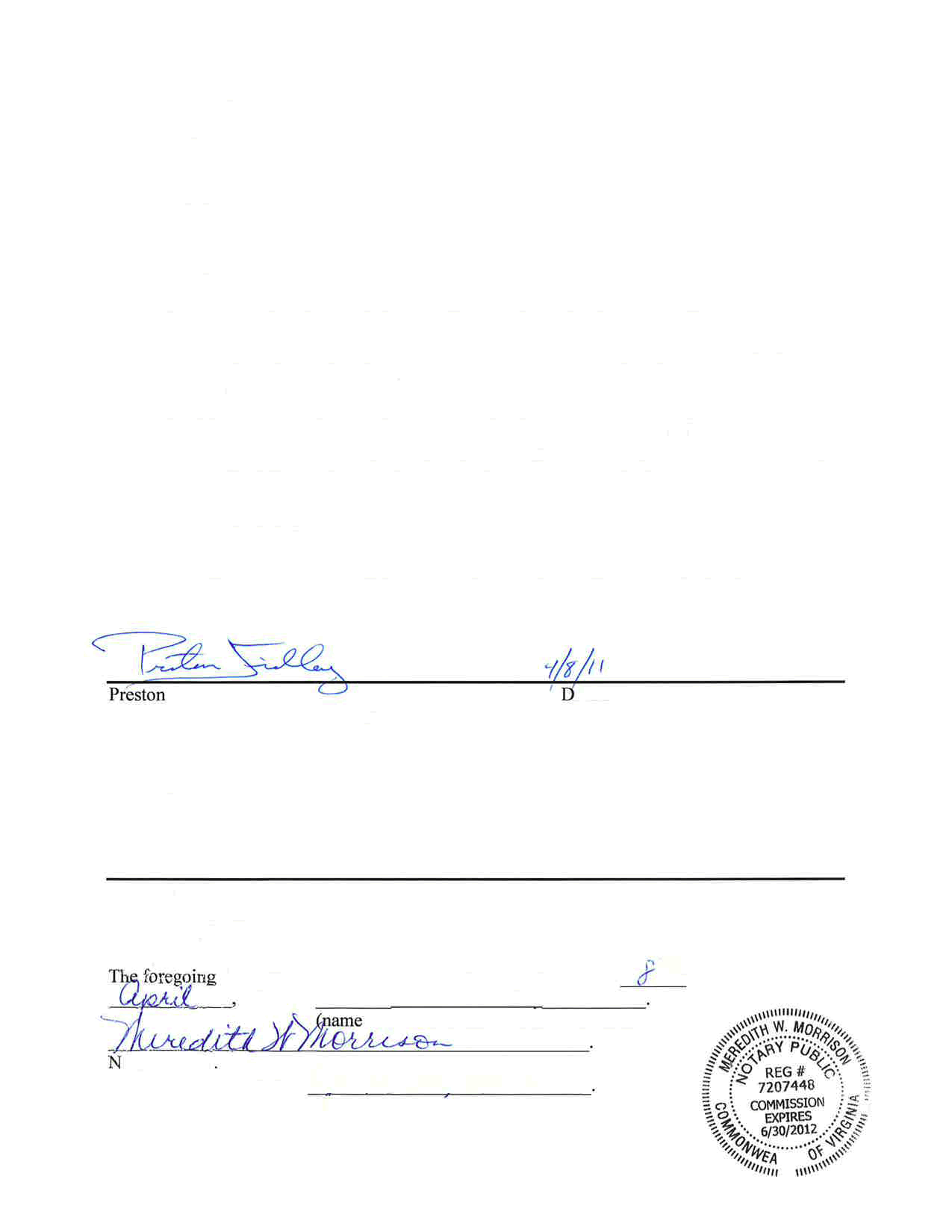
Back to Top*&*
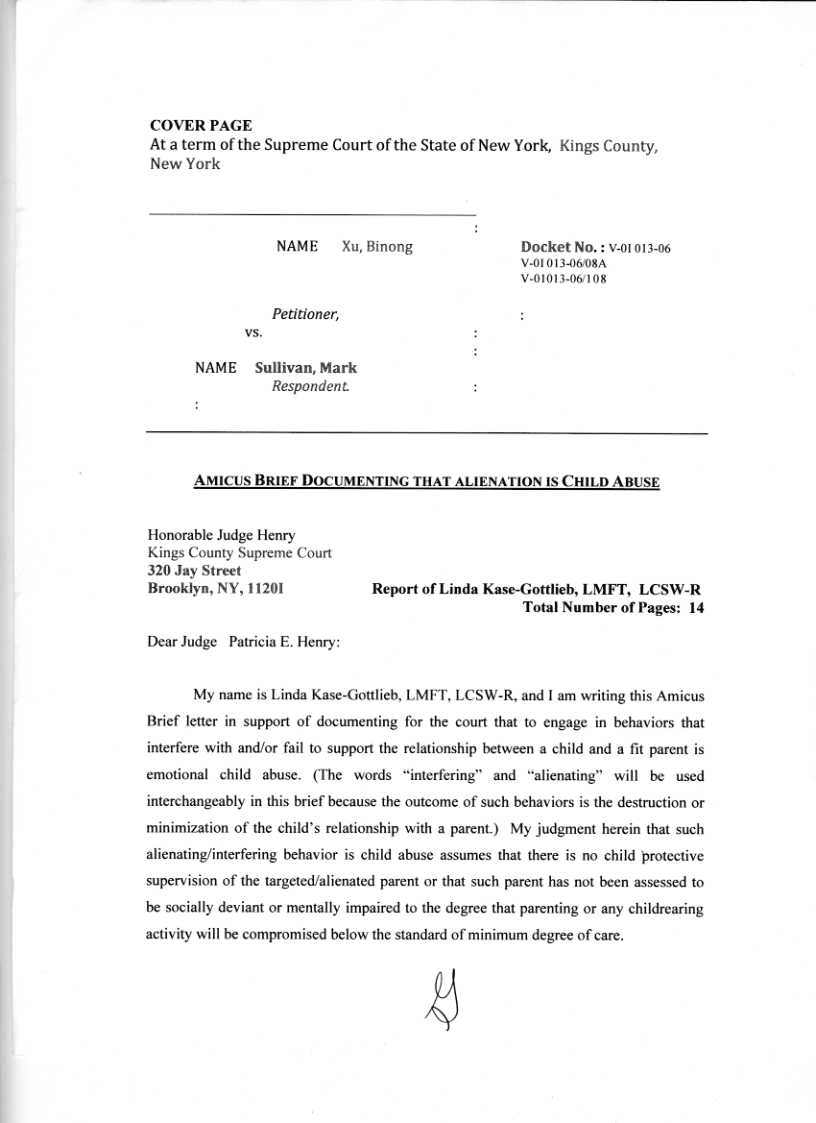
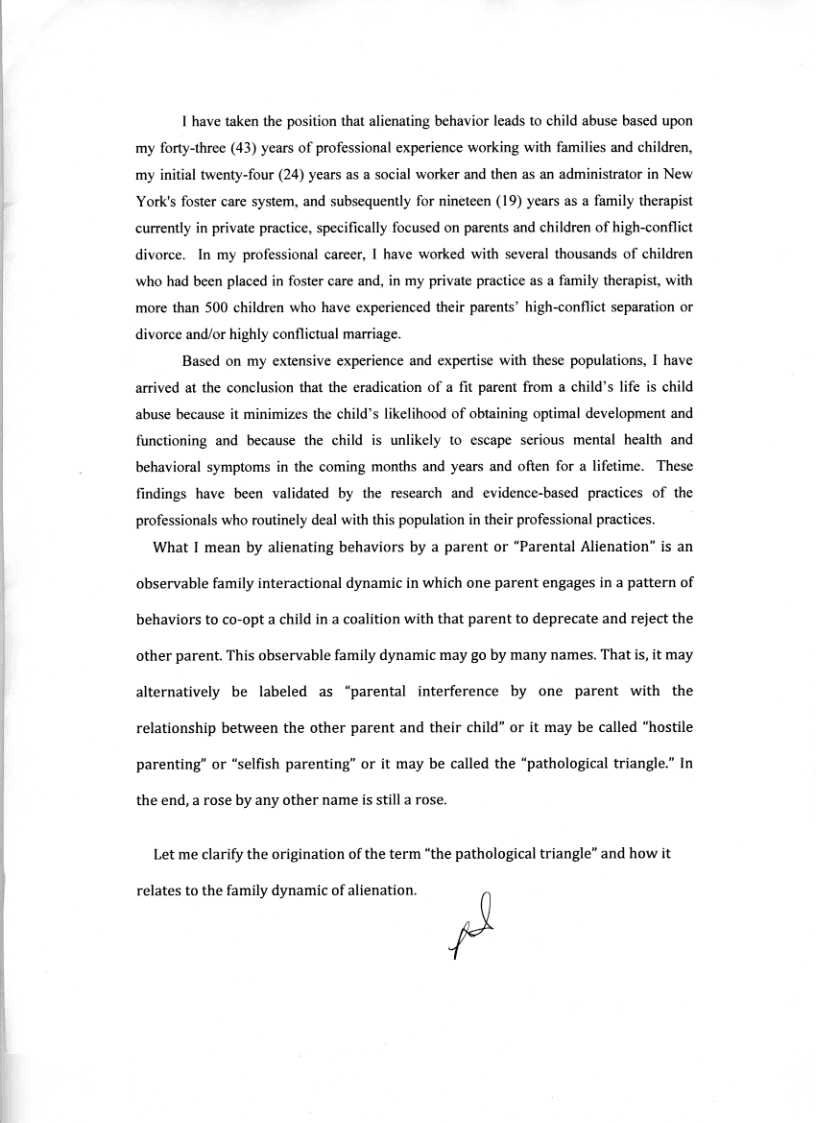
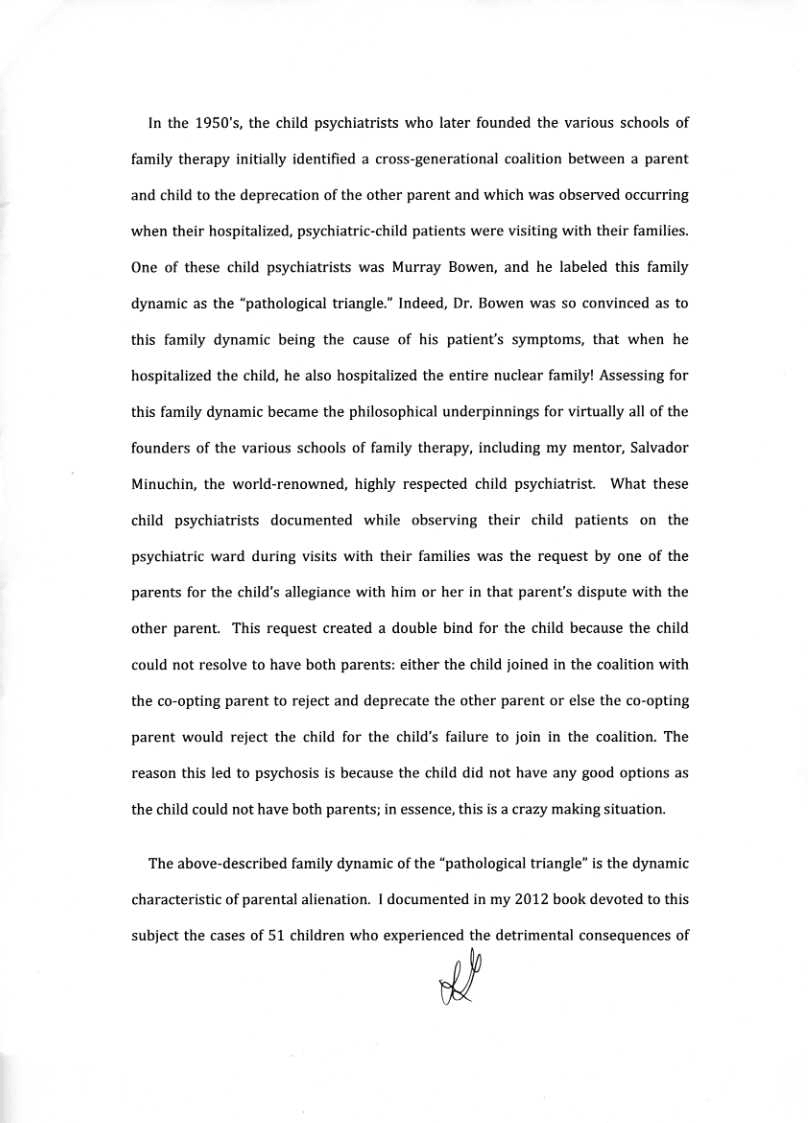
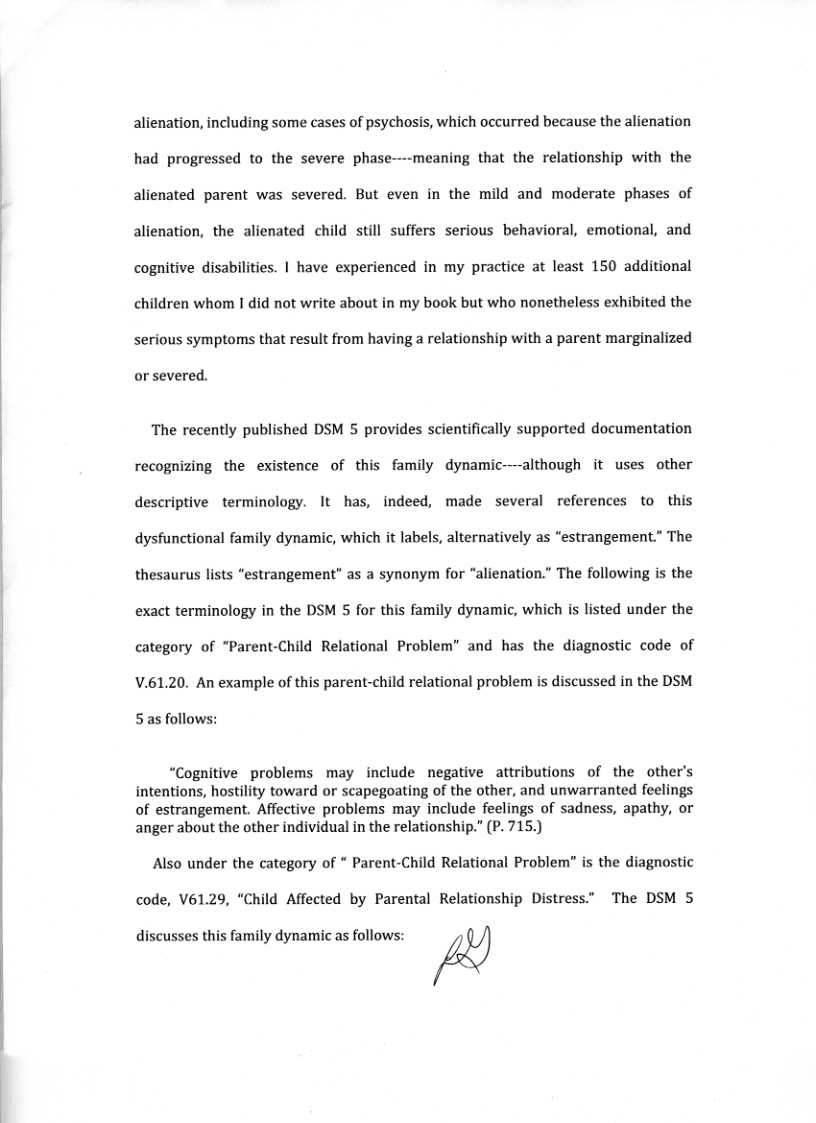
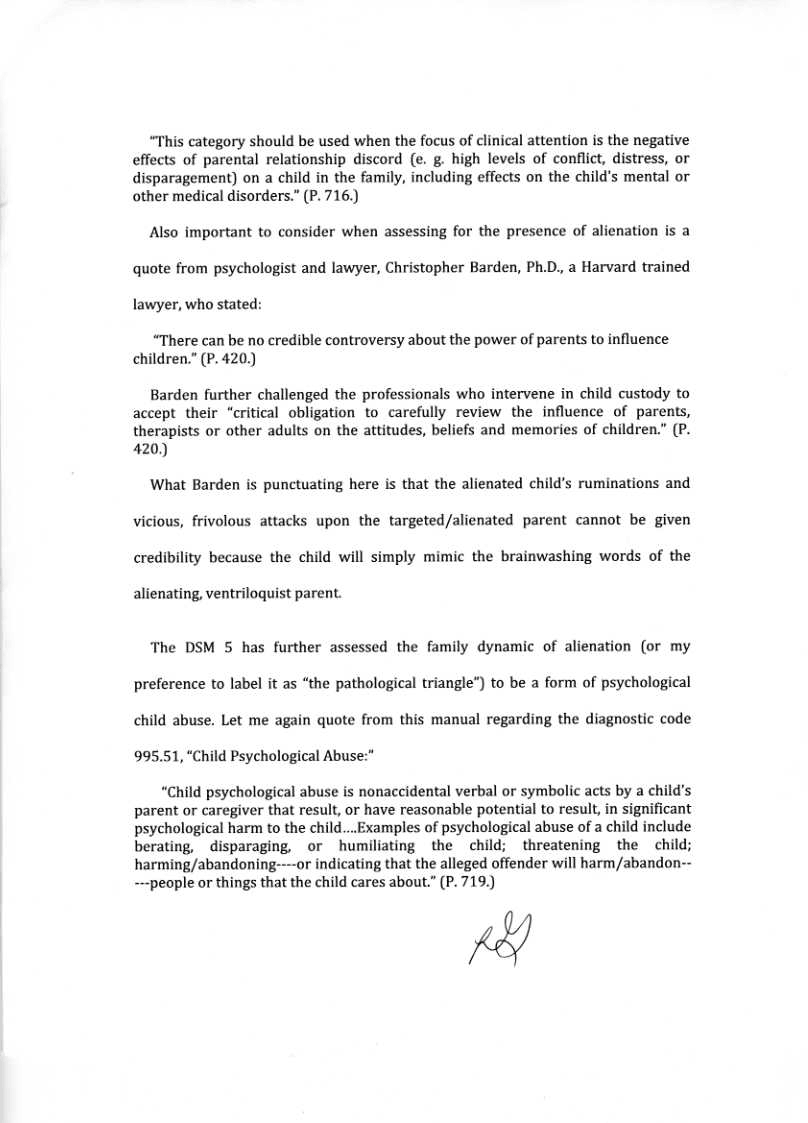
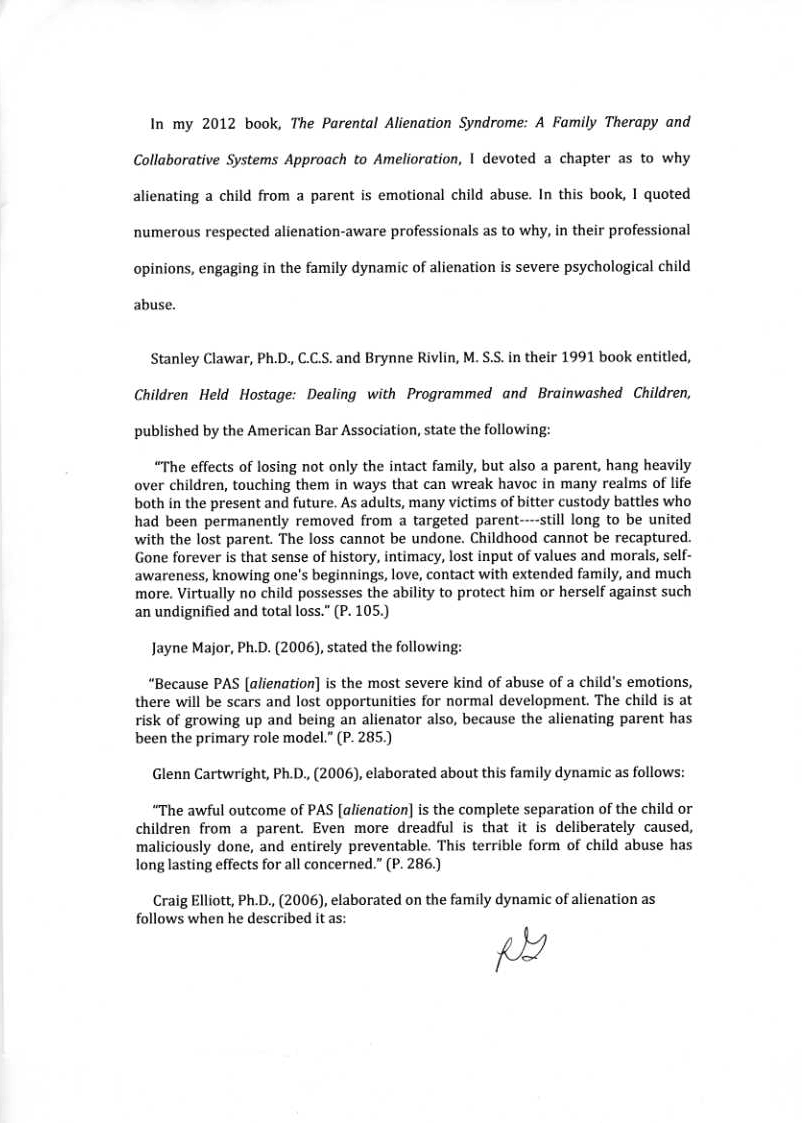
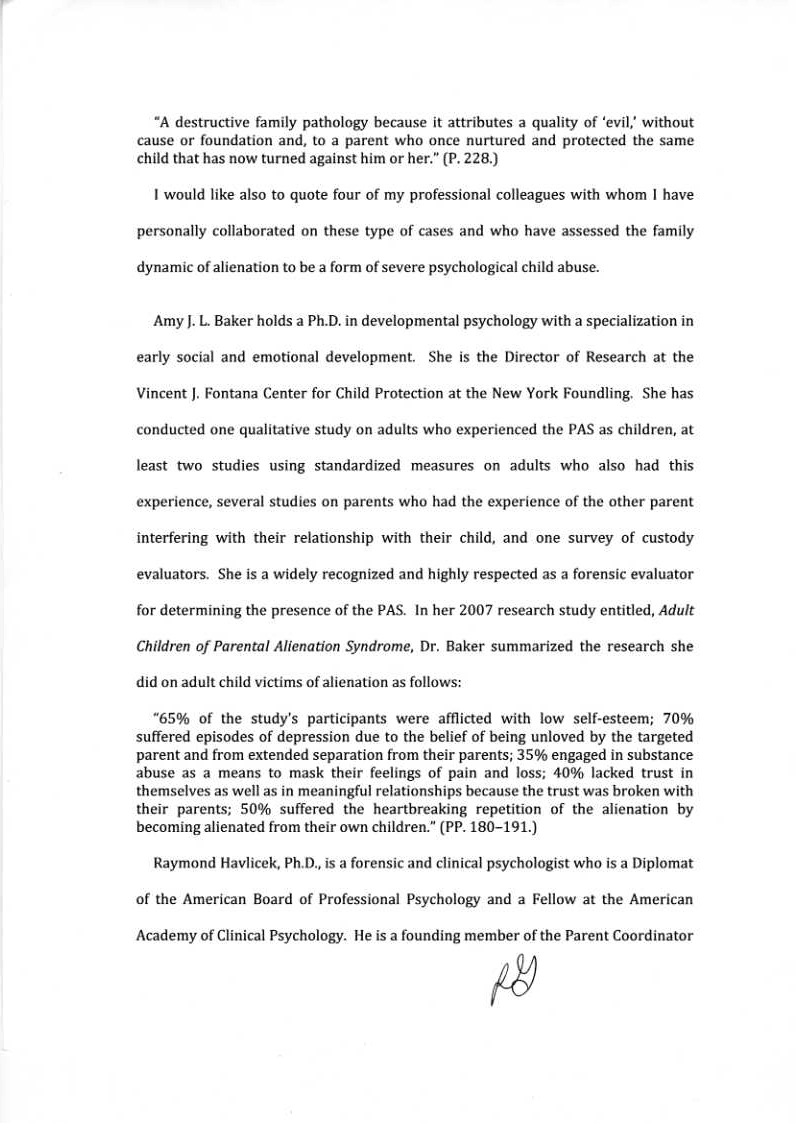
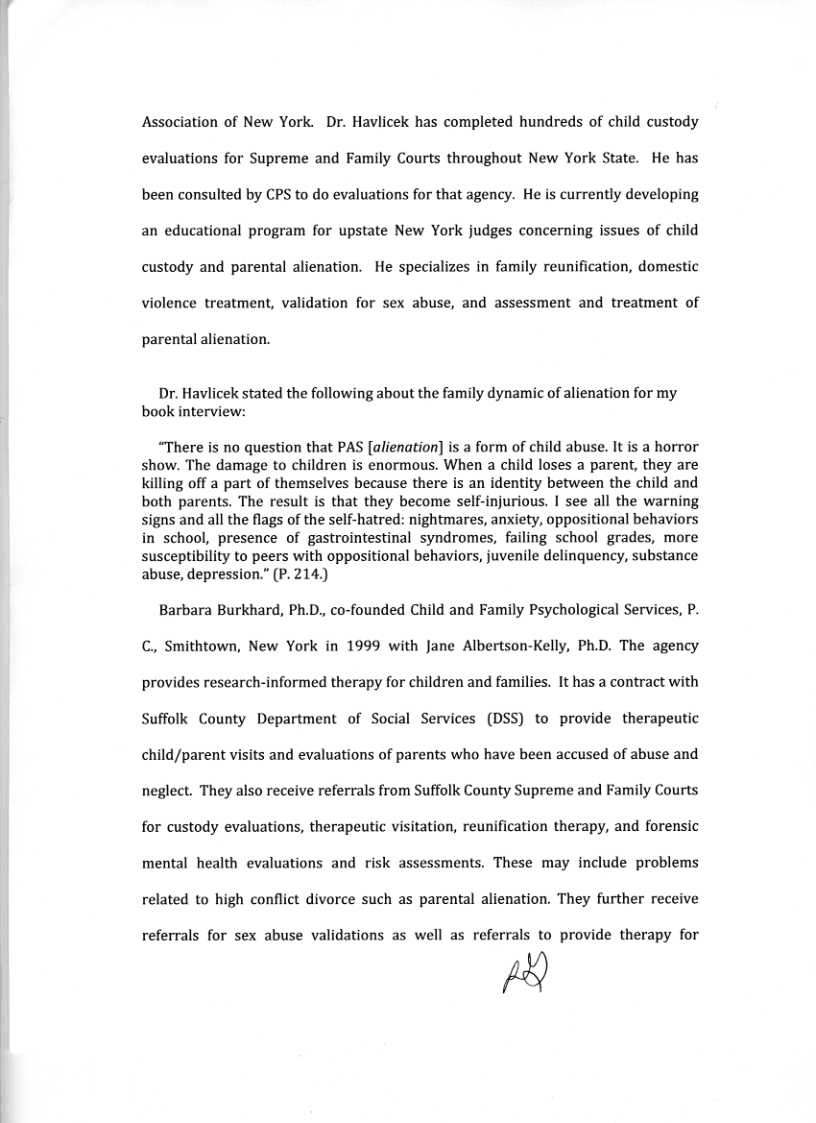
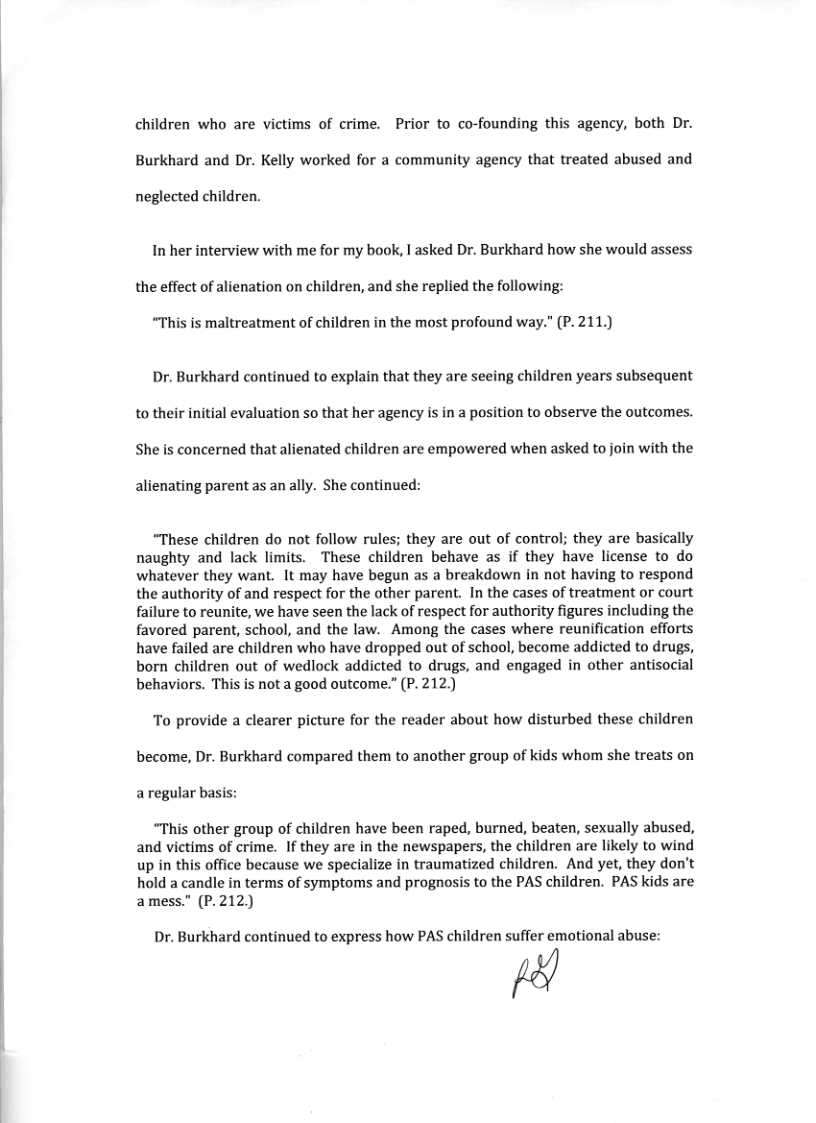
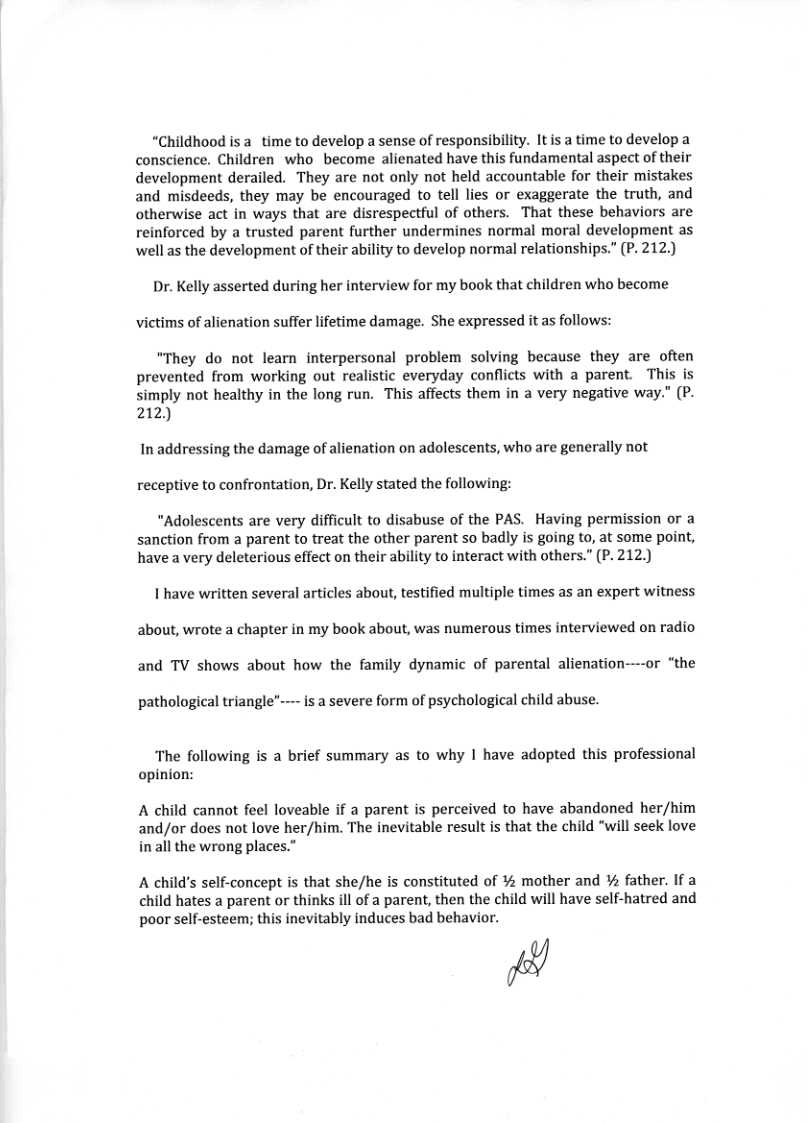
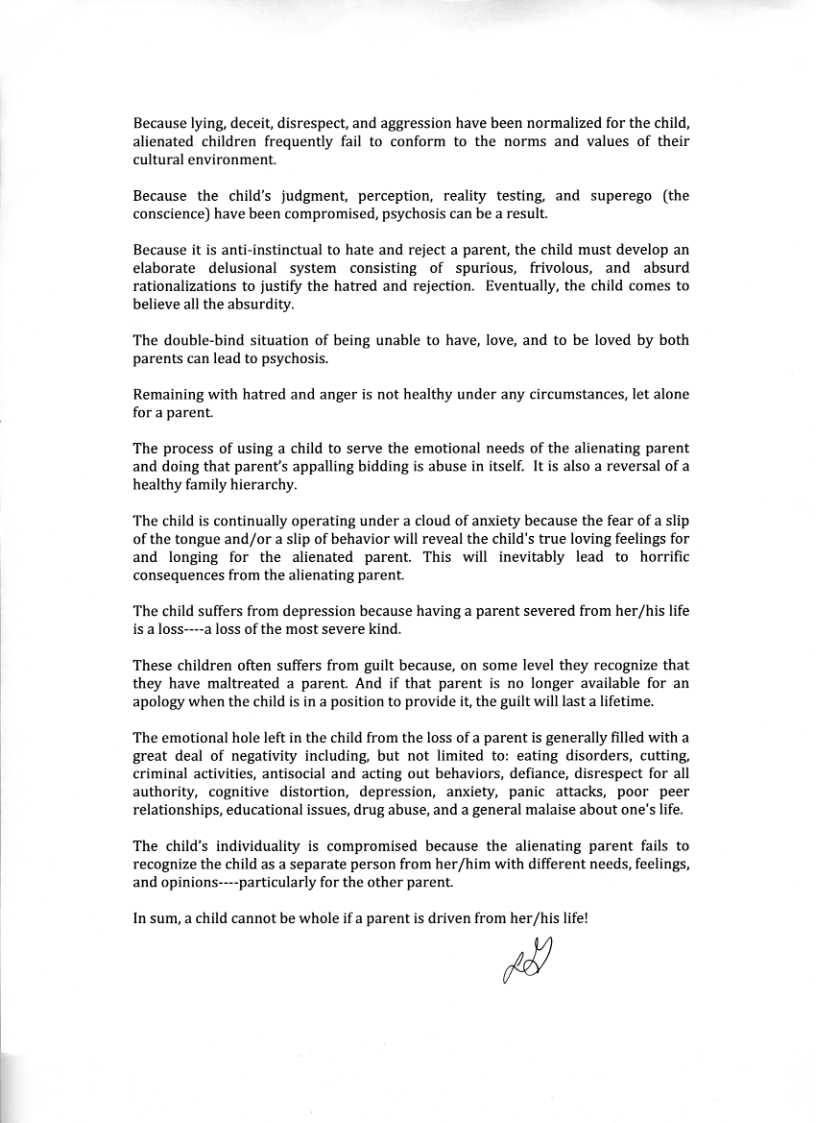
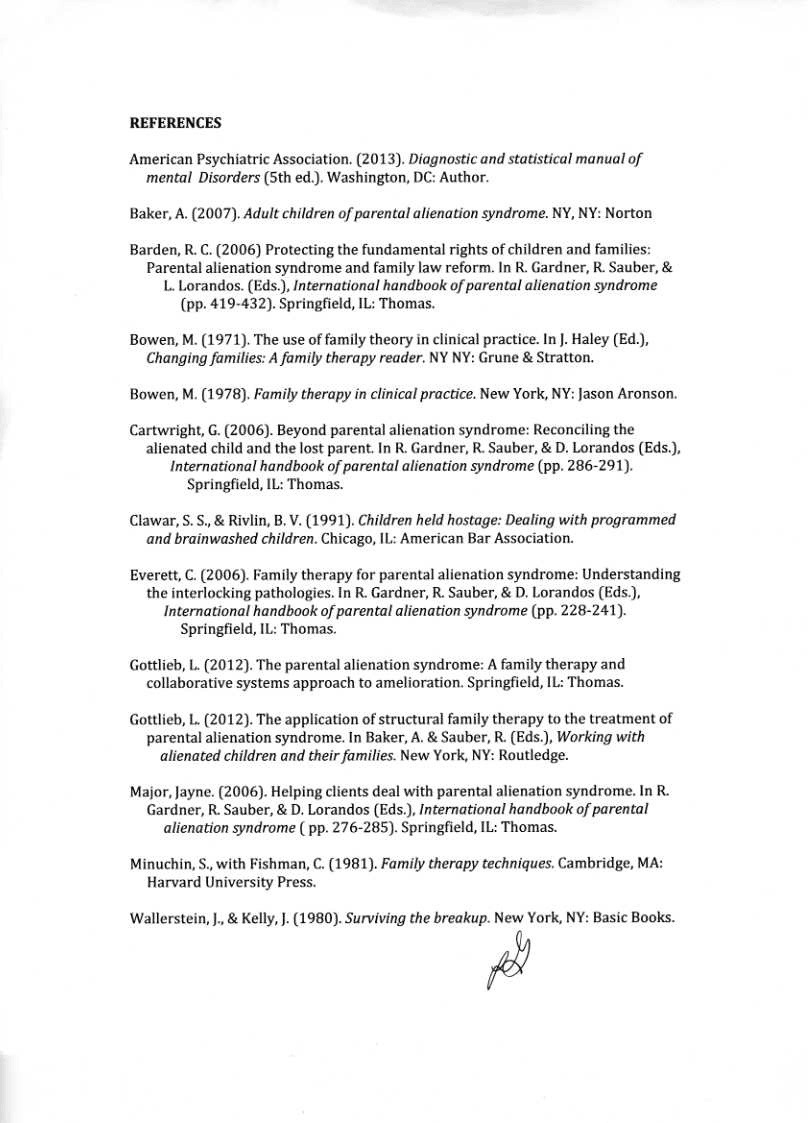
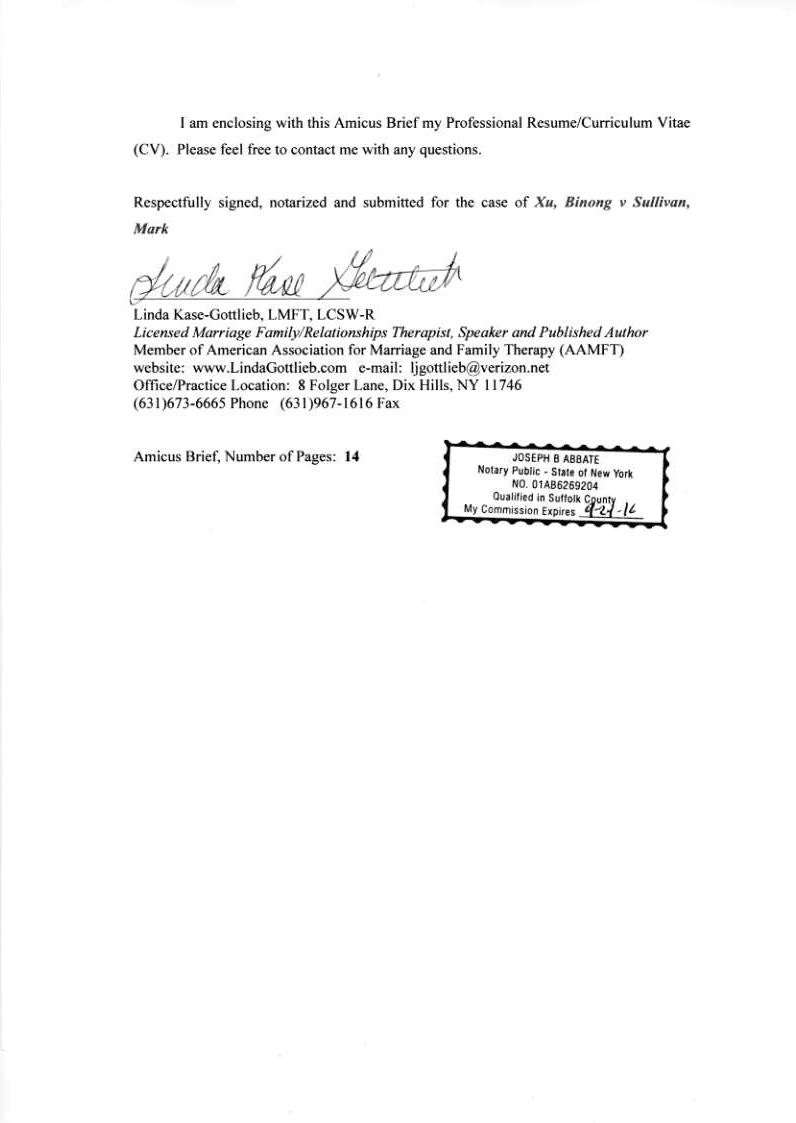
*&*
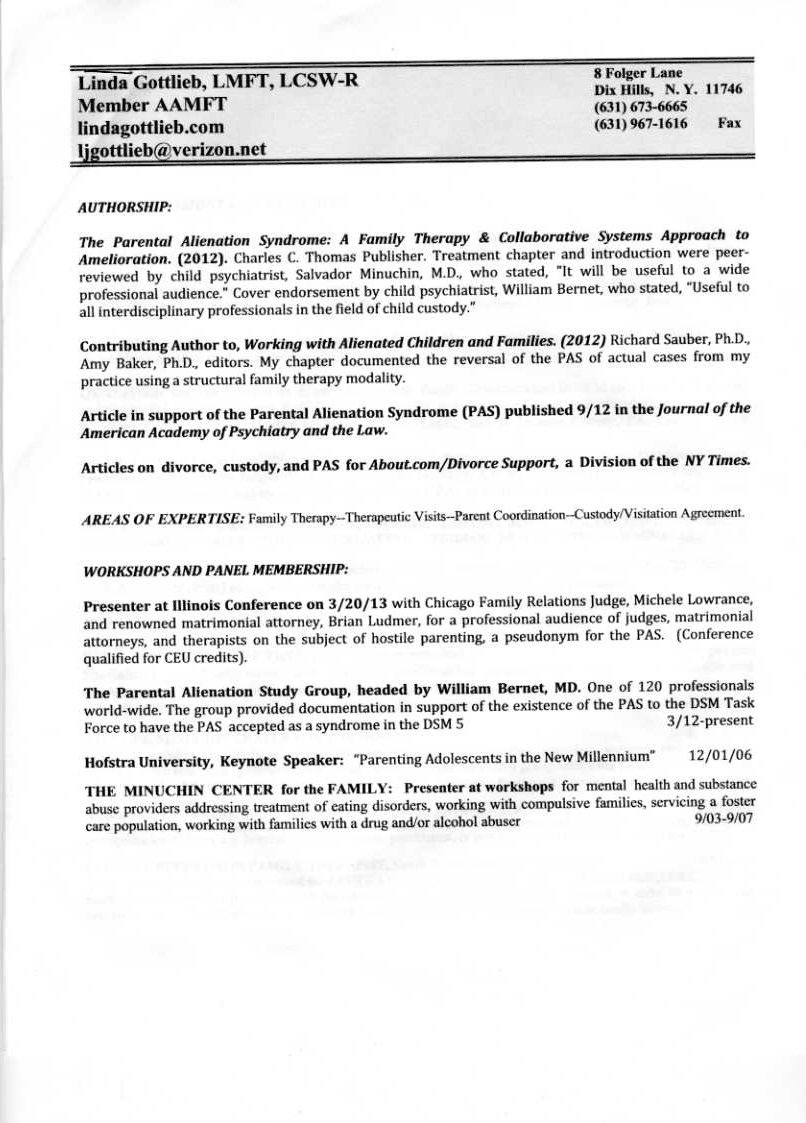
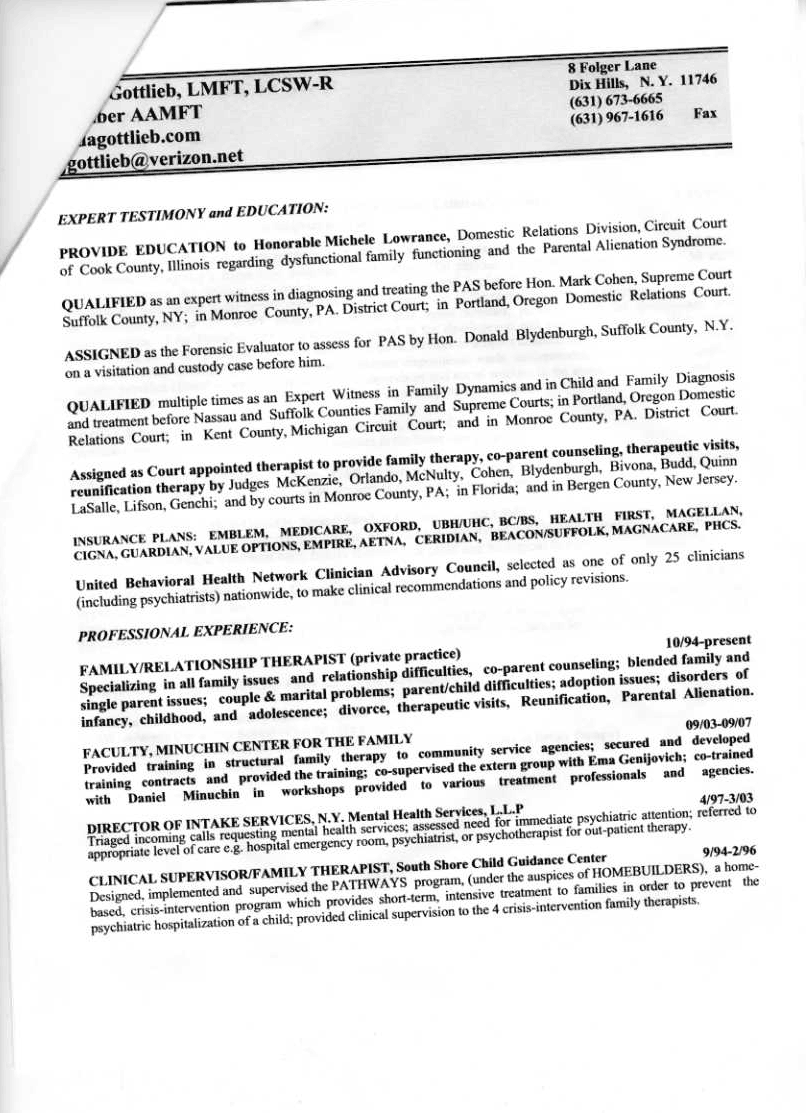
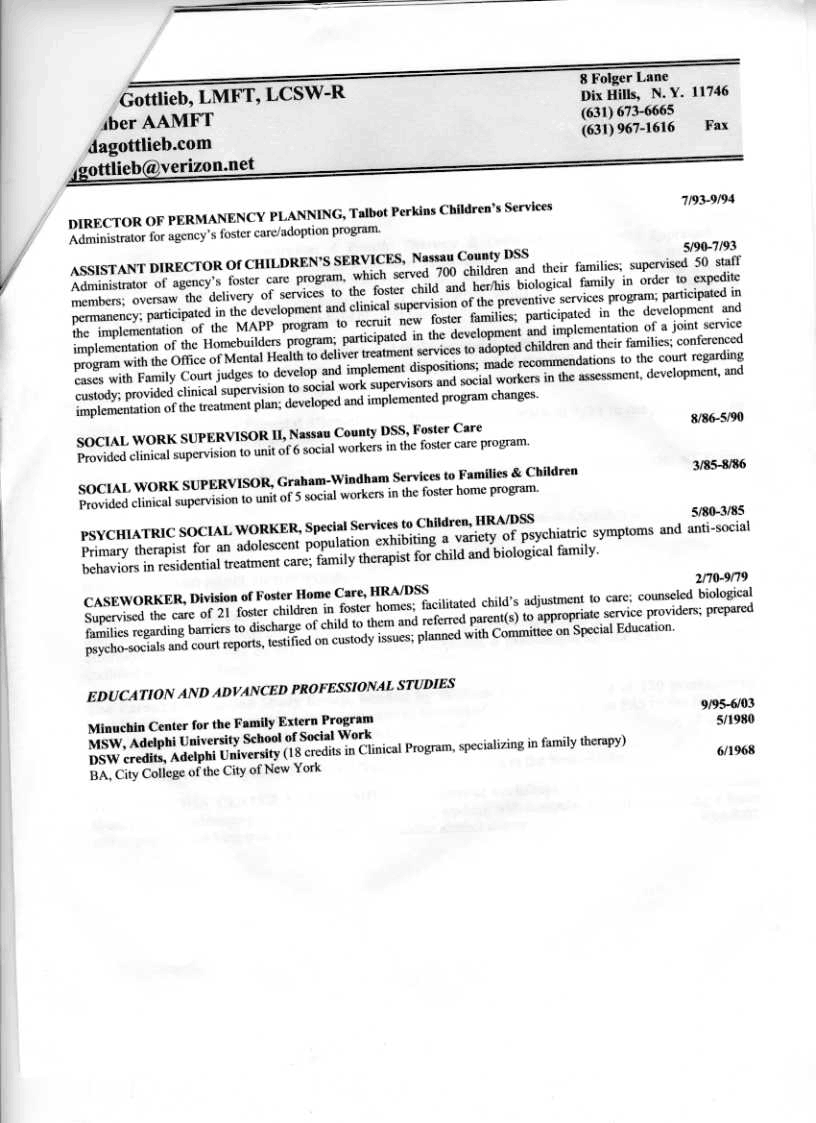
*&*
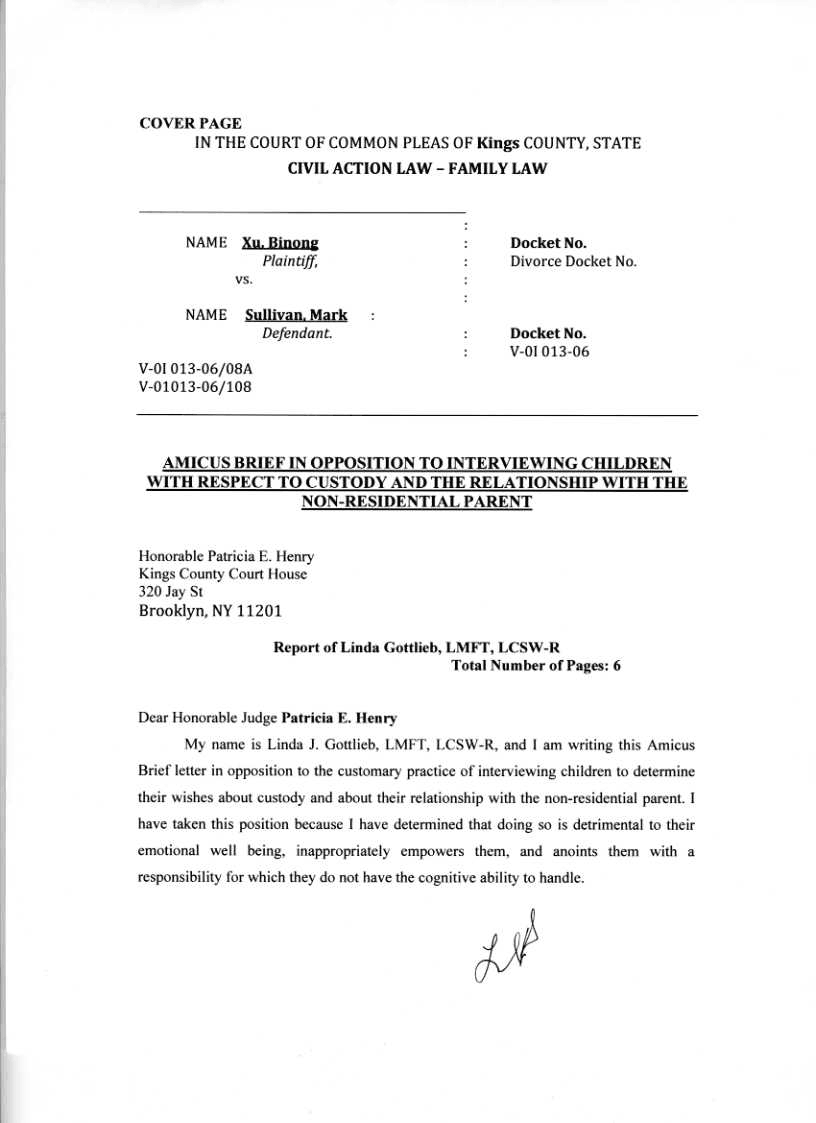
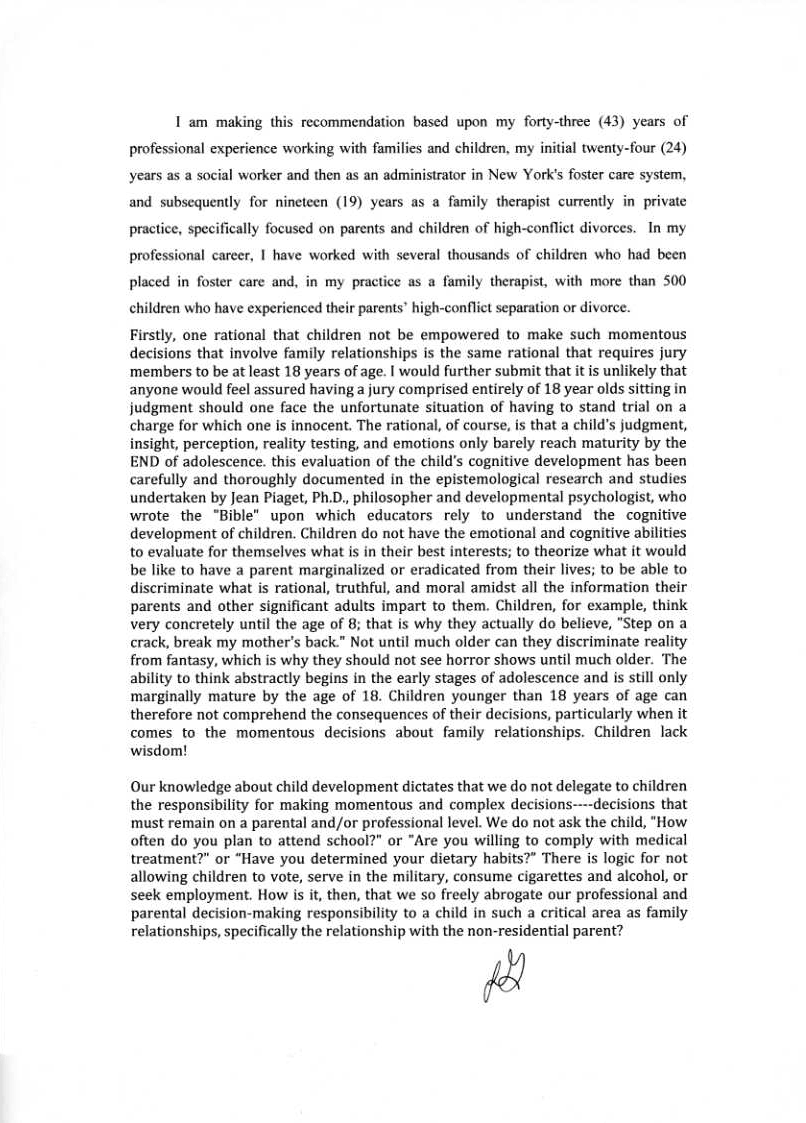
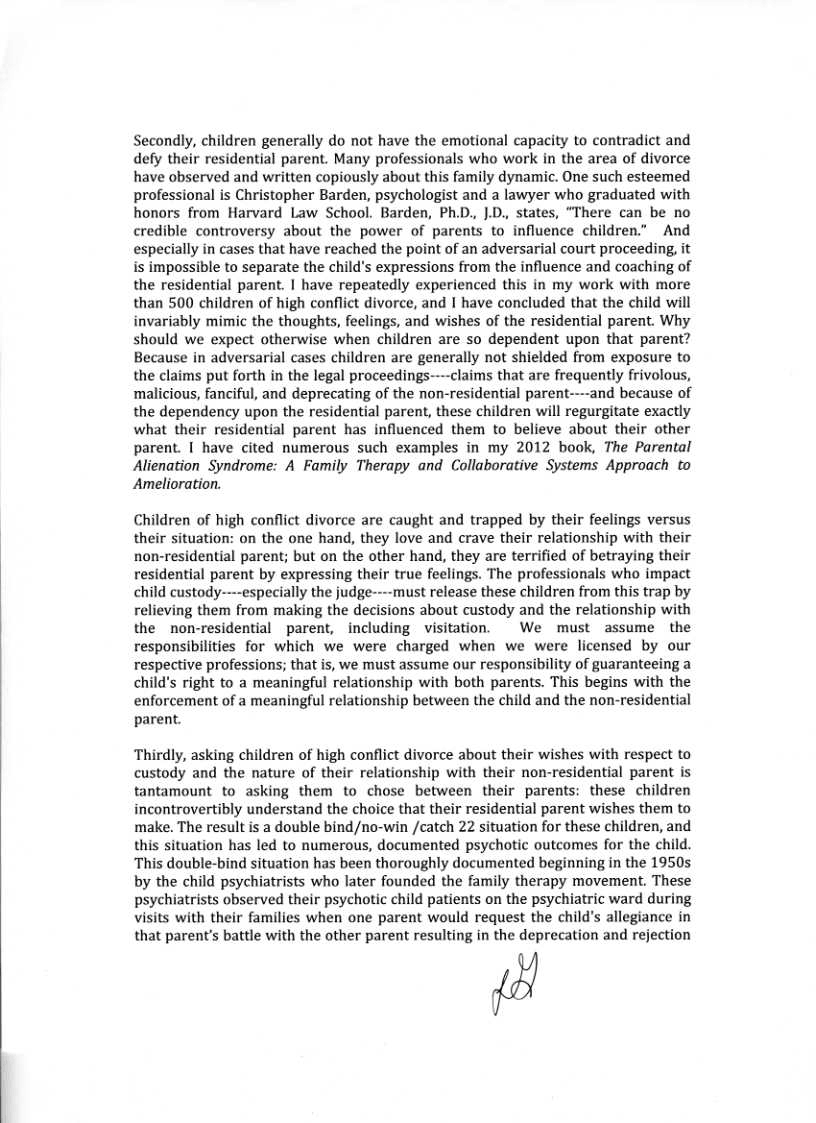
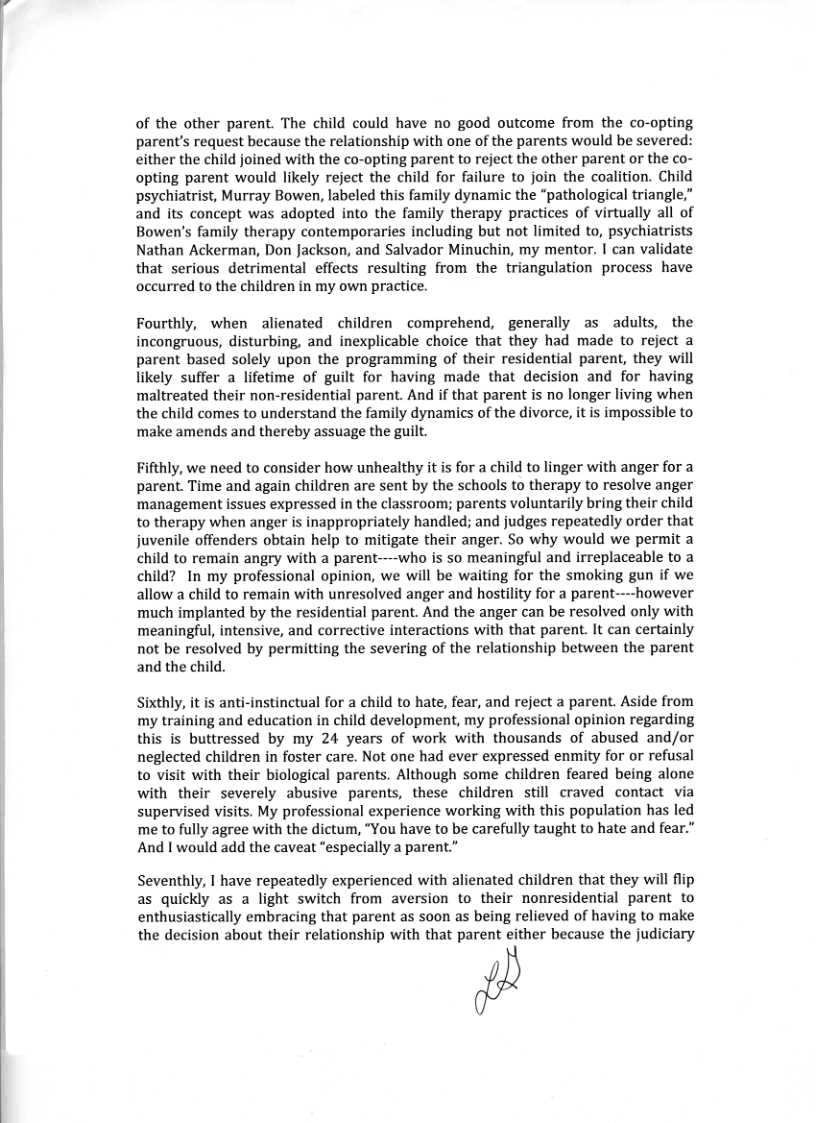
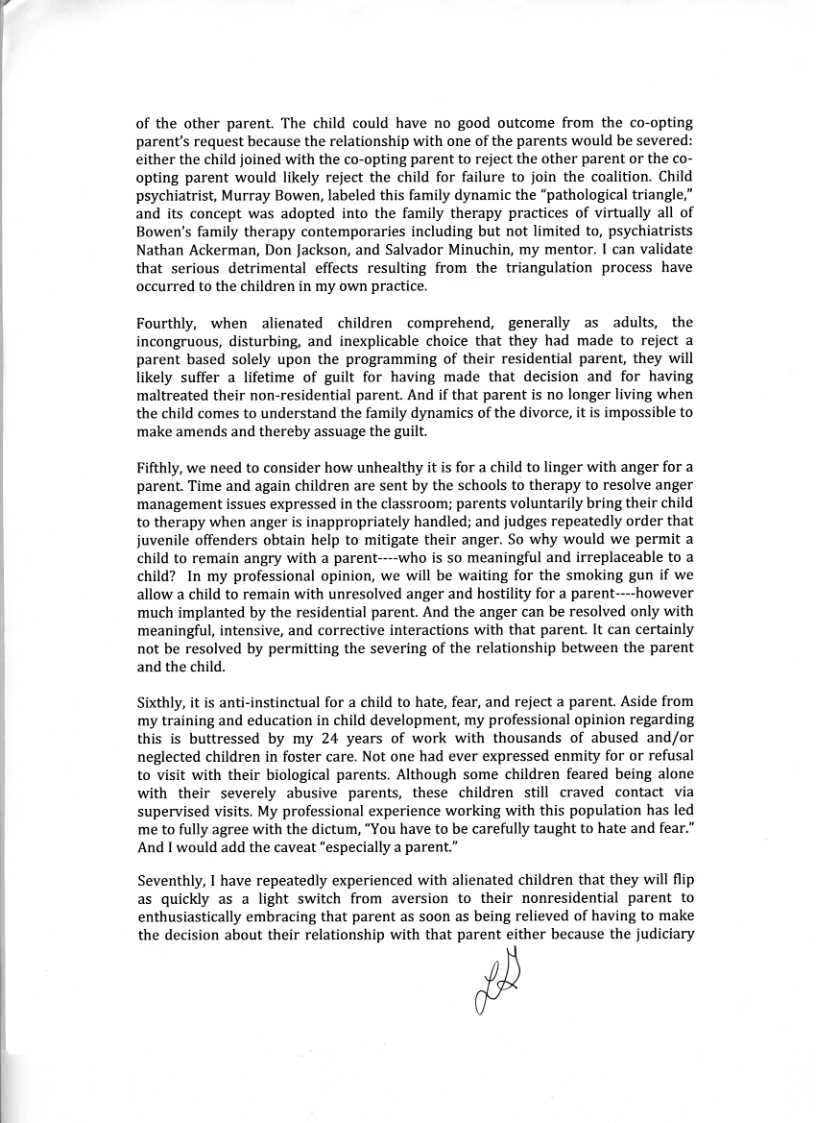
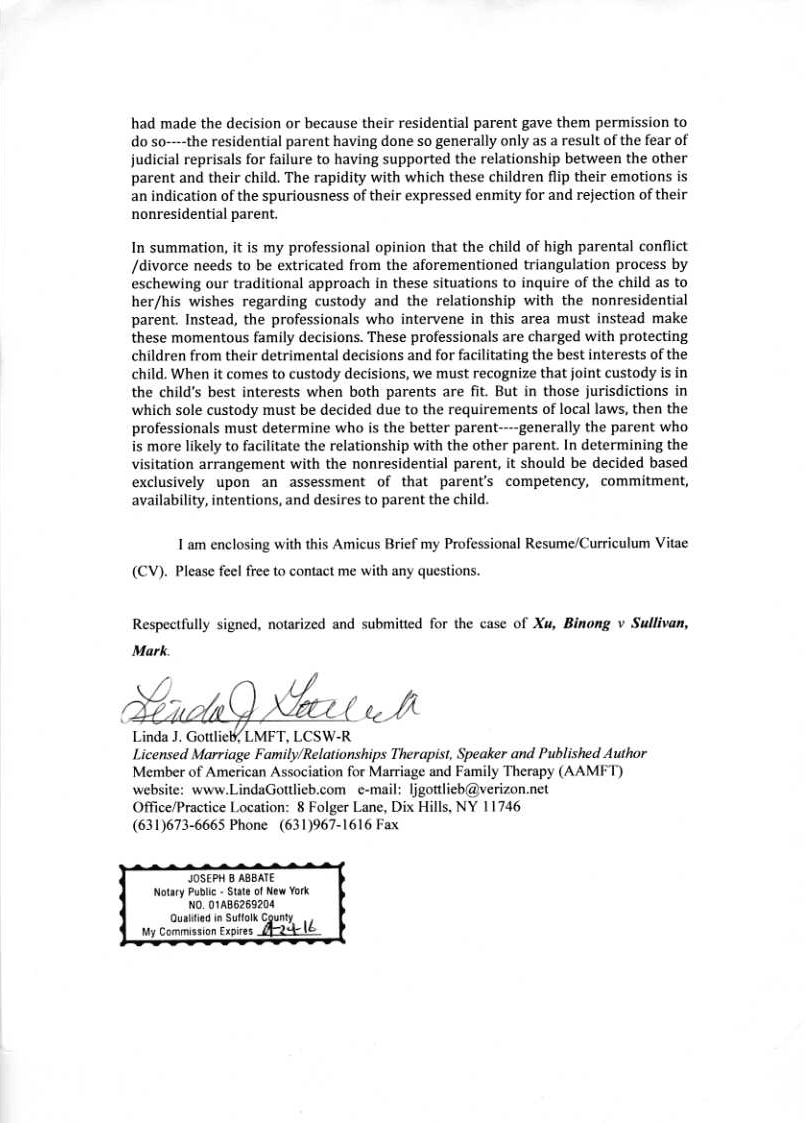
SUPREME COURT OF THE STATE OF NEW YORK
APPELLATE DIVISION: SECOND JUDICIAL DEPARTMENT
IN THE MATTER OF A PROCEEDING UNDER
ARTICLE 6 OF THE FAMILY COURT ACT
BINONG XU
Petitioner,
against
MARK SULLIVAN
Respondent
On Appeal to the Kings County IDV Court
Docket No. 2010-09212, 09214
- PRELIMINARY STATEMENT
This is an appeal of the judgment of the Kings County Supreme Court IDV Part dated September 23, 2010 which denied appellant Mark Sullivan’s petition for joint custody of his child Elizabeth and denied his petition for unsupervised visitation. For the reasons which follow the ruling on the visitation petition should be modified to grant unsupervised visitation and daily telephone contact and the matter should be remanded for a new hearing before a different judge on Mark's joint custody petition.
QUESTIONS PRESENTED
- Where the mother's claims of violence by the father were unsubstantiated and not worthy of belief, the testimony of three caseworkers who supervised visitation was that the father always behaved appropriately, the child loved him, looked forward to seeing him and was sad to leave at the end of the visits; the attorney for the child failed to express the desires of the child to the court and the court failed to inquire about them did the the court's refusal to order unsupervised visitation and telephone contact deny appellant and child their joint right to reasonable visitation, deny the father's constitutional right to due process, was it not in the best interest of the child and did it lack a sound and substantial basis in the record?
- Where the lower court did not find that the testimony of either party was entirely credible and yet relied on the testimony of the mother for its ruling denying the father's petition for joint custody even though the court made a finding that the mother contradicted herself on important issues and where appellant established that the mother's initial petition was based on allegations which the mother admitted at trial were false did the court's denial of the father's petition for joint custody lack a sound and substantial basis in the record?
STATEMENT OF FACTS
Introduction
This appeal brings up for review the cross-petitions of Mark Sullivan [hereafter Mark] and Binong Xu, [hereafter Binong] for custody of their daughter Elizabeth (born on October 21, 2004) and the final order of the IDV court that, barring further order of the court, Mark would have only supervised visitation with his daughter for the rest of her childhood and that he would have to pay for the supervision even though he had been unable to pay for it during proceedings.
The case was initiated in Family Court but was transferred to IDV Court when Binong made claims of violence. These resulted in criminal charges and the court resolved those charges with a plea to disorderly conduct; a conditional discharge, and a two year order of protection. Binong later also brought a petition for willful failure to pay child support. A matrimonial matter was added which is not a subject of this appeal but which impacts it as described below.
Mark contended in his petition, filed September 12, 2006, that Elizabeth’s best interest required that he be granted custody, or at least joint custody, because he had been Elizabeth’s primary caregiver since her birth and because he was better able to provide the necessary level of care. Binong also claimed to be Elizabeth's primary caregiver since birth even though she returned full-time to work a few months after Elizabeth's birth.
The court states in its Order that “on December 12, 2008, the father withdrew his petition for custody and it was dismissed with prejudice” (Order of 9/20/10 at 8). This is not quite accurate. What actually occurred was, as shown more fully below: a) the parties entered into negotiations for a settlement; b) one of the conditions for the settlement, had it gone through, was that he would withdraw his custody petition in exchange for concessions on visitation and other matters; and c) the settlement was abandoned but not until Mark was induced to state on the record that he would give up his custody petition. Thereafter he repeatedly stated on the record that he was not withdrawing his custody petition.
Throughout the proceedings Binong made accusations of domestic violence by Mark which were never substantiated by any other source. It was simply her word against his and the entire issue of whether her claims were true depended entirely on her credibility. Many of Binong’s accusations against Mark were based on what he allegedly said to her. Binong had a Mandarin interpreter throughout the proceedings based on her representation that she was not fluent in English yet she testified that he made specific detailed threats to her in English which she claimed to understand clearly enough to testify as to their accuracy (G. 27-30) Her ability to understand English was obviously an impediment to the trustworthiness of Binong's testimony and the court's reliance on her translation of what Mark said to her in English was misplaced.
Notably, as described below, the lower court found that Binong was not completely credible yet the court based its ruling on Binong's illogical and unsubstantiated claims of violence which Mark vehemently denied. Specifically, Binong made claims for litigation purposes that he repeatedly choked her and threatened to kill for more than two years while they lived in China but admitted that she never sought any intervention from any authority or even from her family. According to Binong she was afraid to go to the police in China because it was socially improper and first contacted the authorities when she reached the U.S. and secured a visa approximately two years after they were married.
In fact, Binong’s initial petition was based on a false statement which she later admitted was untrue and everything that followed was a result of that lie. She stated in her petition, sworn to under oath, that:
[Petitioner] states that [Respondent] choked her several times. He did this while she was pregnant. [Petitioner] states that in 2005, [Respondent] grabbed her by her hair and slammed her against the wall. [Respondent] was arrested.
In other words, she stated that Mark choked her when she was pregnant and that he was arrested for it. But, as Binong later admitted at trial, it was not true that Mark was arrested as a result of an attack while she was pregnant. The court’s order asserts that this was not a lie on Binong's part but merely a clerical error by court personnel. The record proves otherwise.
After she admitted this was not true Mark requested that the court dismiss Binong’s petition because it was based on a false statement. These false statements were the basis for the court’s issuance of the initial order of protection in Binong’s favor on August 23, 2006 and its initial order that visitation must be supervised – both of which remained in effect for years thereafter and essentially to this day. He contended that the entire action was based on a lie from its inception but Judge Henry simply disregarded Binong's false statement.
Binong made outrageous and unsubstantiated claims throughout the proceedings that Mark: threatened to kill her; hit her; choked her when she was pregnant; grabbed her by the hair and slammed her against a wall, ripped her clothes off, threw objects at her and threatened to kill himself, Binong and Elizabeth. She also testified that she never once sought help from the police or even from her own family for the entire 2 ½ years they lived together in China because she was too embarrassed and they probably wouldn’t have done anything anyway. Mark vehemently denied these outrageous and false claims. He did admit that he was a “yeller” and had thrown things on a few occasions when he got angry -- but not at anyone -- just to express his frustration.
As Mark contended at trial, the reason for Binong's false claims was simple -- she made them up to get rid of Mark once she attained what had been her goal from from the outset, obtaining legal resident status in the United States. It should have been obvious to the court that this was what the action was all about and the reason why she made her outrageous and untrue claims. Unfortunately the court did not recognize that this was the motive for her claims of domestic violence because, as happens all too often in IDV court, Mark was presumed guilty until proven innocent.
Procedural History
Pre-trial Proceedings
At the first appearance in IDV Court Judge Henry entered an order of supervised visitation which was initially supervised by a free program called Safe Horizon. Mark could not pay for supervised visitation because he was homeless and living in a shelter throughout most of the proceedings and due to his difficulties in finding work. After six months Safe Horizon no longer offered him free visitation and then NYSPCC did so for a six months until that program also ran out.
On June 25, 2007 the court modified the visitation order so that any mutually agreed upon adult could supervise the visitation and the parties agreed that a nun would supervise. Mark then made a motion for unsupervised visitation pendente lite. The court conducted a hearing on it and heard testimony from forensic evaluator Mark Rand PhD. and from the supervisor from NYSPCC who observed visits with Elizabeth. The parties consented to a temporary order of unsupervised visitation with conditions, one of which was that Mark could not take Elizabeth out of Manhattan, and that he provide a written itinerary.
In August 2008 Mark did provide an itinerary, advised the supervisor that he was taking Elizabeth to a Chinese “dragon boat festival” and the supervisor advised Binong of this. Binong knew the Chinese festival was not in Manhattan but did not object. At the festival Elizabeth scraped her knee; Mark took her to his home to wash the scrape and, since she had gotten dirty when she fell, he gave her a bath. Thereafter, seizing every opportunity to make her outrageous and false claims of abuse Binong accused Mark of sexual misconduct because he gave his daughter a bath.
Taking Elizabeth to his home was a minor infraction of the terms of supervision but Binong moved by order to show cause to suspend Mark's unsupervised visits. Mark did not receive the mailed notice until three days after the hearing, could not appear, the court conducted a hearing without him or his attorney and then summarily terminated his unsupervised visitation without giving him an opportunity to tell his side of the story. Thereafter, Mark never again had unsupervised visitation with his child even to this day. Notably, more than two years after the court made that unfair ruling the court specifically stated in its final order that it did not find that Mark ever acted in a sexually inappropriate way toward his daughter.
During the pendency of the action Binong also filed two petitions for alleged minor violations of the order of protection which were clearly made for litigation purposes. She asserted that Mark: a) called and emailed her in violation of the order of protection; and b) that “the father called the mother and left a voicemail” (Order of 9/20/10 at 8). None of these communications were threatening in any way and were obviously petty transgressions but the petitioner’s counsel and counsel for the child treated them as though they were capital offenses throughout the proceedings.
On advice of counsel Mark exercised his Fifth Amendment privilege in relation to questions about the criminal charges during his testimony at the custody and visitation hearing. Thereafter the attorney for the child acted as though she were a prosecutor for Mark's alleged crimes while never once presenting to the court how Elizabeth felt about things or whether she wanted unsupervised visitation with her father. The court similarly never inquired as to what Elizabeth wanted and her wishes were never considered even though she was a very bright six-year-old when the court issued its judgment.
In addition Binong filed a contempt motion based upon Mark's alleged failure to comply with a pendente lite order of child support entered in the matrimonial proceeding. The reality was that Mark was not able to pay child support because he was living in a shelter during most of the proceedings and had not worked steadily for several years.
On June 11, 2010 Mark, while represented by court-appointed counsel, filed a pro se petition for modification of the pendente lite order of visitation, raising constitutional and other federal law claims. He also accused the attorney for the child with acting in derogation of her duties and the mother with fabricating allegations. That petition was adopted by Mark's counsel insofar as it sought unsupervised visitation and the court specifically stated that it ruled on that petition in its opinion in this case. Accordingly, since the lower court considered those constitutional and federal law claims they have been preserved for appellate review.
The trial in this matter began on December 10, 2008 and finally concluded 2 ½ years later on July 13, 2010. The parties each testified; Mark Rand, PhD., the court-appointed psychologist who conducted the court appointed forensic evaluation testified and the court heard the testimony of the MSW caseworkers who supervised visitation between Mark and Elizabeth: a) Xuan Tran-Walsh, of NYSPCC: b) Chris Hudson, the Assistant Director of CFS, who was qualified as an expert in social work and; c) Jacqueline McGowan, also of CFS. In addition, the court considered the forensic evaluation report dated October 15, 2007, prepared by Dr. Rand and e-mails from the father to his attorney which copied his own attorney, other counsel, the court and members of the press.
The court stated in its opinion that Binong’s testimony was somewhat credible but that there were some issues on which she was not credible. For example, the court found that Binong was not credible when she testified about becoming pregnant (Order at 14) noting that Binong first testified that Mark “put pressure on her to have an abortion” and that “this is inconsistent with her claim that the father should have accepted financial responsibility for the child since it was he who had wanted a child” (Order at 14 [emphasis supplied]). In other words, she first testified that Mark didn’t want the baby and later testified that he was the one who wanted the baby. This was typical of Binong’s testimony -- she would say anything to portray herself as a victim of Mark's abuse even if it had no basis whatsoever in fact. Fortunately the court recognized that she was not always credible.
The court did not specifically state in its opinion that Mark’s testimony was not credible, merely that it contained “inconsistencies” and that he was “evasive” (See Order of 9/20/10 at 10). The court also credited the testimony of the caseworkers who observed the visitation which was very favorable to Mark.
As described more fully below, the trial testimony described the following. Mark and Binong met over the internet in 2001 when she was living in China and he in the U.S.. Binong was still married when they began to communicate but she contacted Mark nearly every day for a year and eventually convinced him to visit her in China in October 2002 for three weeks to discuss the possibility of marriage. Binong had been married for six years to a Chinese man but abruptly sought and obtained a divorce about a month after Mark agreed to marry her. When Mark came to China to visit Binong, seeing an opportunity to become a legal U.S. resident, Binong had sex with him and convinced him to marry her. She quickly got a divorce in November 2002 and married Mark about a month later in December 2002. The reason for this became apparent during trial where it was disclosed that, for the same kind of work she made about $6,000 a year in China but made about $60,000 a year in the U.S..
As soon as they were married Binong began to pressure Mark to obtain a visa for her so she could leave China for the United States. Originally they hoped it would take six to nine months but the process was repeatedly delayed and eventually took 2 ½ years, until August 2005. During that time they had to remain in China and Mark, not being a citizen, was not legally permitted to work. This adversely affected his career as a photographer. Binong claimed he made no efforts to obtain work in China but had to admit that he could not legally work there.
As a result Mark became the primary caretaker for Elizabeth for most of the first two years of her life while Binong worked full-time and furthered her career both in China and the U.S.. The court characterized this as a failure on Mark’s part (see Order at 13-14) even though it would have been illegal for him to work in China. Moreover, if he had been a woman it would have been perfectly natural for him to stay home with his child while the other spouse worked but the court repeatedly criticized Mark for being a stay-at-home dad and applied this double-standard throughout the proceedings.
During 2005, anxious to become a U.S. citizen, Binong traveled to the U.S. with Elizabeth when she was three months old to validate her visa. She left Mark behind in China because they did not have sufficient funds for all three to travel and he was not able to come to the U.S. for another month. Mark followed later when he obtained the necessary funds and while on that visit they resided at Mark’s sister’s home in Springfield, Massachusetts. During that trip Binong had Mark arrested because he went for a walk with Elizabeth for three or four hours after an argument without telling her where he was going. Eventually those charges were dismissed as being without basis.
They returned to China in February 2005; moved to the U.S. permanently in August 2005 and again resided with Mark’s sister in Springfield. Not having worked for 2 ½ years in China and being in his fifties Mark could not find work in the U.S.. He was also hampered by the fact that the photography industry had changed rapidly from film to digital media. They agreed that since Binong had more marketable skills Mark would be Elizabeth’s caregiver and because he would also be able to receive public assistance for himself and Elizabeth while Binong could not because she was only a conditional U.S. Resident. On December 10, 2005 Binong took Elizabeth and left Mark; lived in Massachusetts for a while and then moved to New York City. Binong was able to get public assistance in New York after she claimed that she was a victim of domestic violence but she had not been able to secure such assistance in Massachusetts.
They stayed in touch and reunited shortly thereafter; got housing assistance and secured an apartment in New York in April 2006 but shortly after securing the apartment with her name on the lease Binong again took Elizabeth and left Mark for good in August 2006. Making claims of domestic violence by Mark she filed a family offense petition on August 23, 2006 which initiated this action. This effectively got rid of Mark because she easily obtained an order of protection which required that Mark, who had no place to go, vacate their apartment. When Mark objected to leaving Binong had him arrested, again based on accusations of domestic violence.
As a result he was charged with a family offense and on December 13, 2006, on the advice of counsel, admitted to the violation of disorderly conduct. The court imposed a conditional discharge and a two year order of protection. He was subsequently charged with a violation of that order based on allegations that he sent Binong two non-threatening e-mails and left her a non-threatening voice message. The first e-mail merely stated how much he loved Binong and Elizabeth and asked her to consider reconciliation. In the second e-mail he merely asks Binong to voluntarily meet with him and discuss reconciliation.
Binong also accused him during trial of trying to obtain her address by giving Elizabeth the address of his website. The court found that Binong had no basis for this concern and stated “the court is not persuaded that this was the father’s purpose in providing this information” (Order at 28) and “the court does not find that the father’s intent in providing his website information was anything other than to share family photographs on his website” (Order at 28).
The event which led to the court terminating Mark’s unsupervised visitation was his decision to take Elizabeth to a Chinese “Dragon Boat Festival” in Queens. He provided the visitation supervisor with an itinerary, as required, which stated he was taking her to the festival but did not specifically state that it was in Queens. Binong was aware that he was taking her there and knew where it was. Elizabeth scraped her knee at the festival; he took her back to his apartment to wash the scrape and wound up giving his daughter a bath. Upon learning of this Binong seized the opportunity to make wild accusations of sexual misconduct with no basis whatsoever. She sought and obtained an order to show cause and an immediate hearing on termination of unsupervised visitation. Rather than ensure that Mark had an opportunity to defend himself the court permitted Binong’s counsel to mail the order to show cause for over-night delivery the next day for a hearing the day after that. Specifically the order to show cause to suspend visits issued on August 13, 2008 for a hearing to occur on August 15, 2008 provided that service “upon Respondent by overnight express mail and by personal service upon Counsel for Respondent . . . on or before August 14, 2008 [would] be deemed good and sufficient service” (Order to Show Cause at 1). Mark did not receive it until three days after the hearing and when neither Mark nor his attorney appeared the court impermissibly conducted an ex parte hearing rather than adjourning so that Mark and his counsel could defend against the charges and then terminated his unsupervised visitation with his daughter.
As the court later ruled in its Order, Binong's claims of sexual misconduct and mistreatment had no basis but Mark was denied his right to confront the charges against him. Notably, the court stated in its Order, two years after his unsupervised visits were terminated, “the court makes no finding that the father sexually abused the child or in any way mistreated her during the visit in question” (Order at 30). Had the court protected Mark’s due process right to defend himself rather than permitting an ex parte hearing the court could have reached that conclusion two years earlier and Mark’s right to unsupervised visitation with his daughter would not have been summarily terminated. If the court had acted impartially rather than assuming that Binong’s claims of domestic violence were true it would have been clear that there was no basis for requiring supervision. The three caseworkers who supervised the visits over three years, who all had masters degrees in social work, testified that Mark did nothing to suggest that visitation had to be supervised. Indeed, according to the court itself:
- “All three supervisors testified that the father and child had a warm relationship, the father’s interaction with the child was appropriate and that they did not have to intervene during the sessions. The supervisors would have intervened if any condition of visitation had been violated” (Order at 30);
- Commenting on Binong’s accusation that during a visit Mark gave Elizabeth candy which she called “poisoned” but which had actually only been recalled the court stated, “although the recall was highly publicized and counsel for the mother tried to suggest that the father’s lack of awareness of this was negligent, the court notes that the visitation supervisor was also apparently unaware that that particular candy had been recalled” (Order at 32);
The court also noted that:
Chris Hudson and Jackie McGowan . . . characterized the visits as having gone well, and not requiring any intervention. The father was consistently appropriate and engaged well with the child. The child was comfortable with the father and demonstrated affection spontaneously. She sometimes appeared sad for the visit to end, although she was always happy to be reunited with the mother. The father . . . was appropriate in the sense that he was careful not to create false expectations
(Order at 34).
The Trial
Trial began on December 11, 2008 (Tr. A) with the testimony of Petitioner BINONG XU who, in addition to the facts described above, testified that after she became pregnant, they were discussing Mark's employment and she said to him “you’re the one who wanted the kid so you should be responsible for the kid” (A. 103). As Judge Henry later noted in her Order, Binong then contradicted this statement almost immediately and claimed, two pages later in the transcript, that Mark didn’t “want the kid” and instead wanted her to get an abortion. When asked “what was Mr. Sullivan’s reaction when he found out you were pregnant?” Binong said. “he was very upset. He told me why don’t you go get an abortion” (A. 105). This obvious contradiction shows that she was making up her testimony as she went along and said anything she could think of to make Mark look bad. Being caught red-handed in a lie like this should have destroyed her credibility in the eyes of Judge Henry but the court disregarded it and relied on her testimony that Mark abused her for her ruling.
At the appearance on December 12, 2008 (Tr. B) Mark asked if he could address the court regarding a possible settlement (B. 129). Notably, the court had required on the related matrimonial action that Mark represent himself or hire a lawyer (which he could not do) and so Mark had been addressing the court all along in the matrimonial action as his own counsel. However, when he tried to address the court in the obviously related custody action the court did not permit him to ask about it stating “settlement discussions are not part of the record . . . I’ve encouraged counsel to engage in discussions . . . and I see no basis to give you an opportunity to make a statement in the middle of trial” (B. 129-30). Mark said, “it’s not a statement. I may not have heard you . . . I thought your Honor would need to understand the most recent permutations” (B. 130). The court refused to hear what he had to say and continued the examination of Binong.
Binong then testified that:
- when asked what Mark said when he called her on the phone (which was allegedly a violation of the order of protection) she stated “he said that to forgive him. He wanted to get back together with me, want to start a new life and want me to seek family counseling for help” (B. 157). The e-mail which supposedly violated the order of protection was merely a request for Binong to voluntarily meet him at Barnes and Noble with Elizabeth (B. 158).
- Despite the innocent nature of these communications Binong claimed she was “very shocked” to receive them and that she had no option but to report them to the police and have him prosecuted (B. 160).
Following this testimony Mark’s counsel addressed the court on the settlement issue about which Mark had wanted to address the court - - the provision in the settlement that he withdraw his custody petition (B. 172-73). Counsel stated “on instructions from my client, we are going to withdraw at this time the custody petition” (B. 172). Unable to discuss it with the court and ensure that the rest of the settlement would be honored if he did so Mark stated he agreed with what his lawyer was doing (B. 172-73). Without giving Mark a chance to express his concerns the court said, “then Docket V01014 of ‘06, that petition is withdrawn and dismissed with prejudice” (B. 173).
At the appearance on December 10, 2008 (Tr. C) psychologist MARK RAND was qualified as an expert in family and forensic psychology and testified that his views were drawn from discussions with Binong in which “she reported a long history of being abused and controlled by [Mark]” (C. 22). He took her word for it. Mark never admitted to the hitting or choking Binong accused him of, but he admitted that he yelled and that he threw things on two occasions – although did not hit anyone or intend to hit anyone. He also admitted that he used “nasty words” and curse words on some occasions and it was wrong to do so).
On April 22, 2009 (Tr. D) the court stated they were there on Binong’s “petition for custody and her petition for an order of protection” (D. 3). Attorney Alan Rosenberg, who had withdrawn his client’s custody petition as part of the settlement which did not go through, noted that “Mr. Sullivan had filed for custody”. Binong’s counsel, taking unfair advantage of the failed settlement talks to which she was a party objected that Mark had withdrawn his custody petition (D. 3). The court said “he did indicate on the record that he was not seeking custody” and Mark’s counsel said, “that was in the context of settlement negotiations that eventually broke down”
and that counsel spent most of the third day of trial “mostly talking about a settlement that did not work out” (D. 4). It was in that context “that we were talking about withdrawal” (D. 5). Even though she knew that giving up his custody petition was part of the settlement that never went through Binong’s counsel said, “we object to restoring that custody petition”. The court said, “I am going to permit it” but Binong’s counsel continued to object (D. 5-6) and based on her arguments Judge Henry changed her mind and said, “for clarification I am going to restore Docket V01014 of ’06 as to visitation only” (D. 7).
On April 30, 2009 (Tr. E) Mark Rand’s testimony continued and he stated inter alia that:
- he did his forensic evaluation and report on October 15, 2007, approximately 18 months months before he testified and did not have access to any “recent reports” which could have an effect on changing his opinion (E. 13);
- Mark admitted to him that he was “a yeller” and that it wasn’t right to yell (E. 30-31);
- Elizabeth “enjoyed time with her father and I saw that positive strength on the part of the father” (E. 34).
On May 18, 2009 (Tr. F) Binong continued her testimony which had been adjourned so that Mark Rand could testify. She stated that:
- one time during the supervised visit, “the father gave some sort of poisoned milk” to Elizabeth (F. 4) and she knew it was “poisoned” because “it was broadcasted in newspaper, on TV” that it “has poison in it” (F. 5). (This was the candy which was recalled and the court later made a finding that Mark did not know it was recalled). Binong, as usual, portrayed Mark in the worst light possible by claiming three times that the candy he gave her was “poisoned” as though he would deliberately poison his own daughter;
- she made claims that on several occasions Mark choked her but admitted she did not see a doctor when she received the “injuries to [her] neck” that “prevented [her] from breathing” because she “did not have medical insurance” (F. 27);
- she claimed he threatened to have her deported but she admitted he took no action to do so (F. 36).
On October 19, 2009 (Tr. G) the court noted that it relieved Attorney Rosenberg at his request and assigned Allison Hart to represent Mark. Ms. Hart requested a mistrial and the court denied the motion (G. 2-3). Binong continued testifying and stated:
- when she lived in China she was making under $10,000 a year, she contacted Mark over the internet when she learned he was a U.S. citizen and was employed (G. 17-20). Their internet discussions led to a plan to settle down in the United States (G. 15). They became romantically involved, agreed that he would come to China to live with her at her apartment and admitted she was still married when she agreed to this (G. 23);
- Mark arrived and stayed with her in September 2002 and they became “intimate” even though she was still married (G. 24). She had been married for about six years at that point (G. 24);
- when she married Mark in December 2002 she was 39 years old. Elizabeth was born nearly two years after Mark came to live in China - - on October 21, 2004 (G. 48);
- Binong had a Mandarin interpreter throughout the proceedings based on her representation that she was not fluent in English. She testified that he made specific detailed threats to her in English which she claimed to understand clearly enough to testify as to their accuracy (G. 27-30);
- At one point when Elizabeth was one and a half, teething and “crying continually” Mark gave her liquid “Tylenol and Ibuprophen” which was an over-the-counter pain medication. Binong objected and threw away the medicine (G. 51-52). Even though she was “crying continually” Binong “did not think my child would need to take medication” (G. 52).
- It took Binong until August 2006 to obtain permanent resident status, public assistance and publicly funded housing assistance with her name on the lease (G. 60-61) and when she did she left Mark, taking Elizabeth with her (G. 61). She made claims of domestic violence against Mark, which enabled her to get a temporary order of protection and get him evicted from their apartment (G. 61). (This explains why she waited until then to have Mark arrested and evicted -- until she obtained permanent resident status it was helpful to be married to a U.S. citizen who was the father of her child). After she became a permanent resident and secured public assistance and housing assistance she got an order of protection based on domestic violence claims and returned to the apartment with two officers who evicted Mark from his home and arrested him when he objected (id.).
On October 20, 2009 (Tr. H) Binong continued her testimony and stated that:
- In China the police do not do anything about a domestic violence and a man could beat his wife whenever he wanted and be sure that he would not be arrested (H. 89). She claimed that if a woman tried to tell anyone that she was being beaten by her husband “[p]eople would only laugh at you” (H. 92);
- She also claimed that her parents would not have done anything to help her if she told them she was being beaten or choked while she was pregnant (H. 104).
On October 27, 2009 (Tr. I) visitation supervisor Xuan Tran Walsh testified that:
- She supervised Mark’s weekly visitation from September 2008 to March 2009 and never had to intervene once due to improper activity by Mark (I. 15). Elizabeth never hesitated when going to Mark; she engaged and played with him and he reciprocated (I. 15). She showed physical affection; hugged and kissed him (I. 15) and all the visits were “appropriate” and “loving” (I. 15-16). She would say “I love you Daddy” and he would say “I love you Elizabeth” (I. 16);
- The agency asked that Mark complete a parenting skills course and he did so (I. 21-22). She told Mark on one occasion that the Chinese white rabbit candies he brought Elizabeth had been recalled and he said he was not aware of that (I. 22). Ms. Tran-Walsh was not aware of it either - - it was Binong who told her they were recalled (I. 22).
MARK SULLIVAN's testimony began on October 28, 2009 (Tr. J) and he stated that:
- He was fifty three years old, obtained a Bachelor of Arts from Rochester Institute of Technology (RIT) and he had always made his living since 1991 as a freelance photographer (J. 3). He had suffered financial setbacks as a result of the 2 ½ years he spent in China trying to get a visa for Binong during which he could not work. At that point he was working “per diem” at 10 dollars per hour as a temp (J. 3-4) but had lived in shelters throughout most of the proceedings. He had worked the week before but not that week and his income was spotty (J., 4-5). He was living in a shelter at the time of his testimony (J. 6) although by the time the court issued its final order he had his own apartment;
- He met Binong on the internet in July 2001. It was Binong who first contacted him (J. 6). They communicated on the internet for about a year and a half then spoke on the phone just before he traveled to China (J. 6). She agreed to a visit in which he would live with her (J. 6). Mark was making a living as a freelance photographer at that point and put his career on hold to travel to China to meet her (J. 8);
- After he arrived their relationship became “intimate”, she became his “girlfriend” and stayed in the apartment which she owned with her husband, to whom she was still married (J. 9). He never spoke Chinese, and could not even say “hello” in that language (J. 10). He had obtained a visa to go to China for three weeks to meet Binong and he took a sabbatical from his job to do so (J. 10). During that three week visit they became “engaged to be married” (J. 11). Before returning to China, from October to November 2002, he worked in the United States on getting Binong a visa so she could move to the United States (J. 6), made a visit to his Congressman’s office to arrange this and collected and submitted necessary paperwork (J. 13). The sole purpose of returning to the United States after they became engaged was so that he could work on obtaining her visa (J. 13-14). The plan was to marry in China and then return to the United States to reside (J. 14).
- Mark returned about a month later in early November 2002; they were married on December 12, 2002 and lived in China thereafter for 2 ½ years trying to obtain a “permanent resident” visa for Binong (J. 15). The Congressman’s office told him it would take about nine months to get CR-1 “Conditional Resident” status and a K-3 visa (J. 16). The conditional resident status that came with her visa was “good for three years ” (J. 17) and it was dependent on them remaining married (J. 17);
- She was making about $6,000 a year at that time but Mark could not work without a “work permit.” Binong knew this all along and she was “ok with that” (J. 19-20);
- They planned on having a child and when he learned she was pregnant he was “very happy” and so was Binong (J. 29).
On January 6, 2010 (Tr. K) Mark continued his testimony and stated that:
- When he “first met” Binong they immediately had discussions about relocating to America (K. 10). His “main focus” while they lived in China was “to obtain a visa” for her (K. 11);
- When Binong finally got her visa during the three week trip to the U.S. it was only a two year visa, not the ten year one Binong had expected, and she was very irate about this (K. 15-17). She became very “upset, angry, withdrawn” (K. 25). One day when they were arguing he told her I’m going to take Elizabeth for a walk because “it would be an opportunity for my wife to relax” and he remained out for about four hours. She called the police on him, claiming that he absconded with Elizabeth, they were waiting for him when he returned and they arrested him (K. 25-26). The state later dismissed the case as being without basis (K. 24);
- They remained in America three weeks, Binong still only had a conditional CR-1 visa and they returned to China to wait for Binong's permanent resident visa. Binong resumed working full-time and Mark became Elizabeth’s primary caretaker. He fed her, clothed her, changed her diapers and did the cooking and cleaning (K. 29). He kept working on her visa and eventually she got the ten year visa which enabled them to move to the United States (K. 30);
- They moved to America for good in August 2005, gave up the lease in China and Binong resigned from her job (K. 30). At that point Binong was not working yet, but Mark was able to obtain public assistance and publicly funded medical care for himself and Elizabeth (K. 40-41);
- Once they moved to the United States for good and Binong got permanent resident status she became withdrawn and argumentative with Mark. He consulted a psychologist who recommended that she go for counseling (K. 46-47). When he mentioned this Binong became very upset and said in her culture would be considered “shaming her in public”. The day after he recommended it he woke up the next morning to find that Binong and Elizabeth were gone (K. 47). He filed a missing persons report on December 9, 2005 and then did not hear from Binong for 14 days (K. 48-49) until December 23, 2005 when he received an email from her (K. 49-50). She did not say where she was but they communicated by e-mail thereafter and then phone calls (K. 51);
- In early January 2006 she and Elizabeth met Mark in New York at the public library (K. 52). After that, by joint agreement he came down to New York on weekends to see them (K. 53) and she agreed to get back together (K. 54). Based on her status as the wife or a U.S. Citizen and mother of his child she was able to get public assistance for an apartment in Brooklyn with the lease in her name and they moved in together early April 2005 (K. 55-56). Binong was working as a temp and he resumed his role as Elizabeth’s primary caretaker (K. 55-56). It was he who found daycare for Elizabeth and who found her a pediatrician (K. 56);
- At one point when she was acting angry and depressed he said that if she was not committed to the family she should leave (K. 64-65). Shortly after that she waited until she could be alone with Elizabeth and then absconded with her (K. 65-66). It was not because of domestic violence, it was because their relationship changed when she got her permanent resident status and she was arguing with him and angry at him all the time (K. 65-66). He filed a missing persons report, the police came and took information, made an investigation and then told him to wait (K. 68-69).
- Days later a detective contacted him by phone and he could hear Binong speaking in the background (K. 70-71). Binong had made claims of domestic violence at that point but ACS conducted an investigation which concluded that neglect was not “indicated” (K. 72). After that Binong obtained an order of protection in Family Court based on claims of violence and on August 26th she came to the apartment with two officers (K. 73). They put a piece of paper on the table which turned out to be the temporary order of protection which stated Mark had to stay away from Binong (K. 74). Shortly thereafter on September 8th two officers came to his home and told him he had to vacate the apartment (K. 75). When he objected to this they placed him under arrest and escorted him out in handcuffs (K. 75). He spent the night in jail, was released temporarily and when he returned to court his attorney, who he first met just moments before, told him to accept an ACD and allocute to disorderly conduct or face a year in jail (K. 76-77), He did what his attorney told him to do;
- After Binong had him evicted from their apartment he had no place to live or any income and he became homeless (K. 78). To obtain the order of protection which forced Mark to vacate their apartment Binong had claimed, among other things, that Mark hit her in the mouth with his elbow and threatened to kill Binong and Elizabeth and himself (K. 78). She filed a custody petition based on the same claims and the case was transferred to Judge Henry in IDV Court in September (K. 79). Based solely on Binong's allegations the court denied Mark's request for unsupervised visitation with his daughter (K. 80). He was not permitted any contact other then one visit a week, strictly supervised, and could not call Elizabeth on the phone or write to her – all based entirely on Binong’s unproven claims that he had been violent (K. 85-86);
- The court later agreed to unsupervised visitation and, as described above, when he took Elizabeth to the Dragon Boat Festival and to his apartment Binong’s counsel sent him written notice for a hearing to take place on August 15th 2008 which he did not receive until August 18th (K. 98-99). On August 15th Mark got a call from his attorney who said the visits had been terminated (K. 99) and he learned that his attorney had also not been present at that hearing (K. 101);
- Binong was able to get on public assistance in New York because she had permanent resident status and claimed to be a victim of domestic violence but had not been able to get it in Massachusetts (K. 218). When Binong finally got rid of Mark it was after she obtained an apartment in her name through public assistance and she and Elizabeth were both receiving public assistance (K. 218) so she no longer needed Mark at that point.
On March 9, 2010 (Tr. L) Mark continued his testimony and stated:
- In August 2006 Binong made a sworn statement that Mark was arrested in China in her original “allegations that started this case”; this was perjury and so the whole case was based on perjury (L. 56). Mark pointed out that during her testimony Binong admitted that this allegation in the petition was untrue when she testified that he was never arrested in China (L. 57). Mark added that “perjury and false allegations have tied me up in court for the last three and a half years” and it all started with her original false statements in her petition (L. 57).
At the conclusion of that appearance Mark’s counsel requested that the court grant unsupervised visitation based on a report from the visitation supervisor that “the visits are extremely successful” and because Mark had recently been able to secure employment; had a residence and was no longer in a shelter (L. 95). The court denied the motion without stating any basis (L. 97).
On March 7, 2010 (Tr. M) Mark testified that:
- It was unfair that Binong had him arrested the day he took Elizabeth out for 3 or 4 hours in Springfield because all he did was take her out for a while without telling Binong and she’d done that many times herself (M. 57). They had argued just before she had him arrested and he admitted he cursed at her; called her names and “over-reacted” but that was no reason to have him arrested (M. 59);
- In the past he supported himself as a free-lance photographer but the industry had changed drastically from film to digital; he could no longer find work and was reduced to taking temp jobs for about 10 dollars an hour (M. 62-64). The little money he made served only to keep him out of the shelter system (M 72);
- He admitted he used curse words with Binong but never when Elizabeth was in the room (M. 81). He also admitted that he told her that if she was not committed to the marriage she should pack her bags and get out (M. 82). This was in reaction to similar things she said to him like she was going to have him arrested again, like she did in Springfield.
On April 8, 2010 (Tr. N) visitation supervisor CHRIS HUDSON, MSW testified that:
- When he supervised the visits with Mark and Elizabeth she was “excited to see Mr. Sullivan and ran to him at first sight and they were affectionate” (N. 25). All of the visits he supervised went well (N. 25). They spoke about school and her activities and played games together and none of their conversations were inappropriate (id.). He never had to intercede during visits (id.);
- Elizabeth never showed any hesitation in going to her father and “appeared to be quite excited to see Mr. Sullivan at the beginning of each of the observations” (N. 29). Mark was “also very excited to see Elizabeth and interested in spending time with her (N. 30). He never felt like “Elizabeth was unsafe” during these visits (N. 30). When the visits ended Elizabeth seemed “sad to leave” and would “delay the end of the visit” (N. 37). She would hug her father and tell him she loved him (N. 37). Mr. Hudson never felt that Mark would put Elizabeth “in harm’s way” (N. 37-38);
- Although these visits went so well they had to end because Mark could not afford to pay for them (N. 39-40).
On May 6, 2010 (Tr. O) JACKIE MCGOWEN, MSW, testified that:
- she also supervised visits between Mark and Elizabeth (O. 5); both father and child were “very happy, affectionate, appropriate” during those hour long visits (O. 9); and there was never any “inappropriateness” (O. 9). She never felt like “the child was in an unsafe condition” and she never had to “intervene in the visits” (O. 9). He would take an interest in her schoolwork and there was good communication (O. 12).
On June 14, 2010 (Tr. P) the parties discussed Mark’s recently filed petition for shared parenting and Mark’s attorney adopted his petition which had been filed pro se (P. 21).
On July 12, 2010 the parties rested and the court heard summations.
The Court’s Findings and Conclusions
In its Findings and Conclusions dated September 20, 2010 the IDV court stated:
- Mark committed one or more family offenses and violated the order of protection by “communicating with the mother via e-mail.” (Order at 52). (As noted, those two non-threatening e-mails merely asked her to consider getting back together) (Order at 52);
- Based on Binong’s claims with no other proof the court made findings of violent conduct by Mark (Order at 53). Based on this the court ordered that, barring further order of the court, Mark would never again have unsupervised visitation with his only child (Order at 53). (This order virtually guaranteed no visitation at all because the court was well aware that Mark was unable to pay for the supervision and had already missed months of visitation because he was unable to pay);
- The testimony was that Binong went back to work full-time shortly after Elizabeth was born; that for most of the first two years of her life Mark stayed home with Elizabeth while Binong went to work, fed her, changed her diapers, cared for her and did the cooking and the cleaning. Nevertheless the court made a baseless finding that Binong “has been the primary caregiver of the child since birth” (Order at 54). (On the contrary, it was Mark who was Elizabeth’s “primary caregiver since birth” until Binong absconded with her based on her false claims of violence);
- Misconstruing Mark’s statements when the parties were engaged in aborted settlement negotiations the court made a finding that “the father previously withdrew his petition for custody after commencement of the trial and it was dismissed with prejudice” (Order at 55). As noted above, this ignores the fact that both Mark and his attorney repeatedly stated that he only agreed to withdraw his custody petition as part of a proposed settlement which was later abandoned;
- Based on Binong’s unsubstantiated claims of violence the court awarded sole custody to Binong and denied Mark’s petition for custody (Order at 55). Relying on the three year old opinion of forensic evaluator Mark Rand the court concluded that supervised visitation was necessary to ensure the safety of the child (Order at 56). The court drew that conclusion even though it specifically found that “no sexual abuse or other maltreatment [of Elizabeth] was proven on this record . . . [n]or does the court find that the father has any ongoing substance abuse problem” which would require supervision (Order at 59);
- The court acknowledged that in making this order it was virtually ensuring that Mark would have no visitation at all, stating “[i]n making this order, the court is cognizant of the fact that there are limited opportunities for free supervised visitation programs available in the community and that the father may have exhausted them” (Order at 61). The court also recognized that Mark “was homeless and residing in a shelter during much of the pendency of these proceedings” and so was not able to pay for supervision (Order at 61). The court concluded that Mark did not have to be homeless, did not have to live in shelters, that it was his own fault he could not find work (even though he had been laid off from his temp position) and so there was no impediment to requiring supervised visitation (Order at 62);
- The court ordered that “the father is awarded supervised visitation” and “if no free program is available the father shall be required to bear the cost of the visitation” (Order at 62) and limited his visits to one hour per week with no telephone contact (Order at 62).
This appeal followed.
ARGUMENT
POINT I
WHERE THE MOTHER'S CLAIMS OF VIOLENCE BY THE FATHER WERE UNSUBSTANTIATED AND NOT WORTHY OF BELIEF, THE TESTIMONY OF THREE CASEWORKERS WHO SUPERVISED VISITATION WAS THAT THE FATHER ALWAYS BEHAVED APPROPRIATELY, THE CHILD LOVED HIM, LOOKED FORWARD TO SEEING HIM AND WAS SAD TO LEAVE AT THE END OF THE VISITS; THE ATTORNEY FOR THE CHILD FAILED TO EXPRESS THE DESIRES OF THE CHILD TO THE COURT AND THE COURT FAILED TO INQUIRE ABOUT THEM THE COURT'S REFUSAL TO ORDER UNSUPERVISED VISITATION AND TELEPHONE CONTACT DENIED APPELLANT AND THE CHILD THEIR JOINT RIGHT TO REASONABLE VISITATION; DENIED THE FATHER'S CONSTITUTIONAL RIGHT TO DUE PROCESS, WAS NOT IN THE BEST INTEREST OF THE CHILD AND LACKED A SOUND AND SUBSTANTIAL BASIS IN THE RECORD.
Requiring that visitation be supervised violated Mark's right to "reasonable access and visitation" (Matter of Schack v. Schack, supra). More importantly, since reasonable visitation is a joint right of both the parent and the child the court's ruling, which utterly failed to take into account how Elizabeth felt about being denied visitation with her father, also violated Elizabeth’s rights and so was not in her best interest.
For a noncustodial parent to develop a meaningful, nurturing relationship with his or her child, "visitation must be frequent and regular" (Daghir v Daghir, 82 AD2d at 194, affd 56 NY2d 938 [1982]; see Matter of Graves v Smith, 264 AD2d 844 [1999]; Matter of Gerald D. v Lucille S., 188 AD2d at 650). The order in this case did not provide for “frequent and regular” or “reasonable” visitation, 103 AD2d at 775-776; see Matter of Brian M. v Nancy M., 227 AD2d 404 [1996]; Matter of Schack v Schack, 98 AD2d 802 [1983]).
“Reasonable visitation” was not only Mark’s right, it was Elizabeth’s right as well. In fashioning a visitation award the court must consider both the right of the parent and the best interests of the child (See also Evans v. Evans, 71 A.D.2d 666)" Matter of Juliane M., 23 AD3d 473 [2005]; Matter of Fisk v Fisk, 274 AD2d 691, 693 [2000]). The unsupervised visitation requirements coupled with the requirement that Mark pay for the supervision did not satisfy this standard because it effectively deprived both parent and child of the opportunity to spend a significant amount of time with each other.
The extensive testimony of the visitation supervisors showed that the father and daughter had a loving and appropriate relationship. Accordingly there were no extraordinary circumstances in this case and it was clearly in the child's best interest to enjoy unrestricted visitation with her father (see Weiss v. Weiss, 52 N.Y.2d 170, 175; Matter of Schack v. Schack, 98 A.D.2d 802; Daghir v. Daghir, 82 A.D.2d 191, 193).
In making this order the court virtually ensured that Mark would hardly have any visitation at all, stating: “[i]n making this order, the court is cognizant of the fact that there are limited opportunities for free supervised visitation programs available in the community and that the father may have exhausted them” (Order at 61). The court also recognized that Mark “was homeless and residing in a shelter during much of the pendency of these proceedings” and so was not able to pay for supervision (Order at 61). The court somehow concluded that Mark did not have to be homeless, did not have to live in shelters, that it was his own fault he could not find work (even though he had been laid off from his temp position).
Binong had a powerful motive to make false claims both before and after this case began because, once she made them, she was treated as a victim by everyone in the system. First by the social welfare agencies which gave her food, shelter medical care and housing because she was a victim, then by the police who arrested and charged Mark based on her claims, then by the attorney for an organization which calls itself the “Sanctuary for Families Center for Battered Women’s Legal Services”. Even though she was making more than $60,000 a year during the trial this vigilant organization was willing to represent her for free because she made claims of violence and they believed her. A fair reading of the record also shows that Binong was even treated as a victim by the attorney for the child who assisted in the prosecution of Mark for the alleged “crimes” of leaving emails and voicemail asking Binong to consider reconciliation and the alleged sexually inappropriate conduct which the trial court later found never occurred. All these parties assumed, simply because she said so, that Binong was a victim and Mark was an abuser and he was treated throughout the proceedings as though he were guilty until proven innocent.
A fair reading of the record discloses that Binong was not a victim at all, she was a wily and ambitious fortune hunter willing to do whatever it took to secure permanent resident status in the United States. Mark was her meal ticket to accomplishing that because he was in love with her, thought she wanted a real marriage with him and he was willing to do whatever it took to make their marriage work. But Binong was only concerned with securing permanent resident status in the United States and all the public assistance she could apply for and all she had to do to accomplish this was falsely claim to be a victim of domestic violence. In the process she also got rid of the man she never loved and who she thought of as a deadbeat who could not support her new American lifestyle.
To do this she was willing to get a divorce from her old Chinese husband so she could marry the new American one who had fallen in love with her. She accomplished this by sleeping with Mark while she was still married, getting him to promise to marry her and then getting a divorce and marrying Mark practically overnight. She did not do it because she loved him -- she did it to become a legal resident of the United States.
The lower court failed to recognize any of this and a fair reading of the record shows that both Judge Henry and the attorney for the child sided with the supposed victim from the beginning of the case. This ignored the obvious and fatal flaws in Binong's testimony which should have shattered her credibility in the judge's eyes. Binong asked the court to believe that for 2 ½ years while they lived in China Mark repeatedly strangled her, even while she was pregnant, and threatened to kill her but that she never said a word to the police or even to her family because it was socially unacceptable in China. The court ignored the fact that as soon as she got her legal resident status in the United States she had no problem at all with going to the police and claiming violence in order to get him arrested.
The court also relied heavily on the three-year-old opinion of the forensic evaluator conducted after the briefest of interviews for the court's conclusion that supervised visitation was necessary to ensure the safety of the child (Order at 56). The court drew that conclusion even though it specifically found that “no sexual abuse or other maltreatment [of Elizabeth] was proven on this record . . . [n]or does the court find that the father has any ongoing substance abuse problem” which would require supervision (Order at 59).
The court paid no heed to Mark's credible testimony that he has a temper and he yells and even throws things if he gets mad but he never hit her or strangled Binong or threatened to kill her or anyone else. The court also failed to recognize that Binong's allegations were claims made for litigation purposes and to obtain public assistance.
Legal Standards
"Supervised visitation is appropriately required only where it is established that unsupervised visitation would be detrimental to the child" and inimical to the child's welfare (see Rosenberg v Rosenberg, 44 AD3d 1022, 1024 [2007]["the Supreme Court's determination to limit the husband's visitation with the child to supervised visitation in a therapeutic program selected by the wife for a minimum of three years was unsupported by the record and an improvident exercise of discretion"; Matter of Gainza v Gainza, 24 AD3d 551 [2005] [a noncustodial parent should have reasonable rights of visitation, and the denial of those rights to a natural parent is a drastic remedy which should only be invoked when there is substantial evidence that visitation would be detrimental to the child; Paul G. v. Donna G., 175 A.D.2d 236, 237; Matter of Vanderhoff v. Vanderhoff, 207 A.D.2d 494; Matter of Hughes v. Wiegman, 150 A.D.2d 449; Purcell v Purcell, 5 AD3d 752, 753 [2004]). The petitioner failed to prove such detriment in this case.
While the determination as to whether visitation will be supervised is within the discretion of the trial court that determination may be set aside if it lacks a sound and substantial basis in the record (see Matter of Khan v Dolly, 39 AD3d 649, 651 [2007]; Matter of Kachelhofer v Wasiak, 10 AD3d 366 [2004]; Matter of Levande v Levande, 308 AD2d 450, 451 [2003]). That is the case here and the lower court's ruling must be set aside.
Burden of Proof
It is the petitioner who seeks to limit visitation who bears the burden of proving that unsupervised visitation would be detrimental to the children's well being (see PURCELL v. PURCELL, 5 A.D.3d 752 [2d Dept 2004]; Matter of Graves v. Smith, 264 A.D.2d 844 [reversed where the petitioner made an “insufficient showing that unsupervised visitation would be detrimental to the child's well-being"]; Matter of Gerald D. v. Lucille S., 188 A.D.2d 650). Binong had the burden of proving that unsupervised visitation would be detrimental to the child (Matter of Mera v Rodriguez, 73 AD3d at 1069; Cervera v Bressler, 50 AD3d 837, 839 [2008]; Matter of Grisanti v Grisanti, 4 AD3d 471, 473 [2004]), failed to do so and the trial court incorrectly concluded that she satisfied that burden.
It is well settled that a custodial parent has the affirmative duty to protect and nurture the child's relationship with the non-custodial parent (Daghir v Daghir, 82 AD2d 191, 194-195 [1981], affd 56 NY2d 938 [1982])[“the custodial parent has a duty to protect and nurture the child's relationship with the noncustodial parent and to ensure access”]. The record shows that, rather than “protect and nurture” Elizabeth's relationship with Mark she did everything she could to undermine it. She certainly did not “nurture” their relationship, when she falsely accused him of trying to poison his own child – a word she used three times in her testimony. She certainly did not nurture their relationship when she lied under oath by testifying that Mark did not want Elizabeth in the first place when she had already testified that it was Mark who wanted the child.
Credibility
Binong will likely argue that the court's determination as to visitation was based upon its assessment of the credibility of the witnesses and so should not be disturbed (see e.g. Matter of Herrera v O'Neill, supra at 423). But this is not a case where the court found one party completely credible and the other not worthy of belief. Instead the court found that Binong’s testimony was sometimes self-contradictory and that neither party was entirely credible. In fact, as described above, the court pointed out specific instances where it found Binong’s testimony not worthy of belief. In such a circumstance Binong should not be heard to claim that the findings of the trial court should not be disturbed because it found that Mark was not credible and that Binong was and the usual deference to the trial court’s credibility determination does not apply here.
And even if the court had found Binong to be entirely credible the ruling denying Mark's petition for custody cannot stand because it lacked a sound and substantial basis in the record (see Matter of Kachelhofer v Wasiak, 10 AD3d 366, 366 [2004]). Indeed, [a]n appellate court would be seriously remiss if, simply in deference to the finding of a Trial Judge, it allowed a custody [and/or visitation] determination to stand where it lack[ed] a sound and substantial basis in the record” (Matter of Gloria S. v. Richard B., 80 A.D.2d 72, 76); (Valenza v. Valenza, 143 A.D.2d 860, 862). The record in this case discloses insufficient evidence to support the Family Court's determination that unsupervised visitation would be harmful to the child.
The court's findings were based, in large part, on the opinion of one psychologist who had examined the father for approximately fifteen minutes about three years before the court rendered its judgment. Given the staleness and superficiality of the evaluation conducted for a few minutes a few years ago there was not a sufficient forensic basis for the court's finding.
Moreover, it was error to deny telephone contact. For the court to deny telephone contact the petitioner had to present sufficient evidence for the court to conclude that it would be inimical to Elizabeth's welfare (see MATTER OF ANAYA v. HUNDLEY, 12 A.D.3d 594 [2d Dept 2004]; Matter of Morash v. Minucci, 299 AD2d 486 [2002]; Matter of Orner v. Orner, 263 AD2d 544 [1999]). There was no such evidence and the judgment should be modified so that it expressly states that the father be permitted daily telephone contact with his child (see MATTER OF ANAYA v. HUNDLEY, 12 A.D.3d 594 [2d Dept 2004] [reversed where the court denied telephone contact] Matter of Darla N. v. Christine N., 289 AD2d 1012 [2001]; Jabri v. Jabri, 193 AD2d 782, 783-784 [1993]).
CERVERA v. BRESSLER, 50 A.D.3d 837 [2d Dept 2008] is quite similar to this case and requires modification of the judgment to permit unsupervised visitation. In that case the court issued a pendente lite order that visitation be supervised while the case progressed and that telephone contact between father and daughter be monitored. For the ensuing “2½ years" of litigation this was the only kind of visitation the court permitted. That order was based "solely on the hearsay allegations of the mother of molestation which were determined by OCFS to be unfounded and stories of incidents, the details of which were disputed by the father.” The court's final order continued this supervised visitation and monitored telephone contact and the father appealed.
The Second Department reversed and held that the evidence in support of the mother's hearsay allegations of molestation were “insufficient to show that unsupervised visitation would be detrimental to the child's well-being". This Court also found it unacceptable that the father was denied unsupervised visitation for the 2 1/2 years of the litigation based merely on the mother's allegations of molestation which were never proven and that, as in this case, the accusations were clearly the result of "anger, hostility and resentment between the parties". Finally this court noted that it was "especially unfortunate that the Supreme Court permitted the mother to have so much control over visitation and, especially, over telephone contact between father and daughter." (id.) Under those facts, so similar to the instant case, the Second Department held that "this arrangement resulted in the violation of the father's right to "reasonable access and visitation" and that the lower court disregarded the rule stated in Matter of Schack v Schack, 98 AD2d at 802 that "the conflict between the parties should not interfere with the development of a relationship between the noncustodial parent and the children” (see also Matter of De Biase v. Scheinberg, 47 A.D.2d 657) see Matter of Smith v Molody-Smith, 307 AD2d 364, 365 [2003]).
Similarly, in MATTER OF GAINZA v. GAINZA, 24 A.D.3d 551 [2d Dept 2005] the father appealed from an order of the Family Court which denied his petition to modify an order limiting him to only supervised visitation with his child. The Second Department reversed and held that it was error for the Family Court to require that the father's visitation with his daughter be supervised on the basis of the forensic evaluator's concerns and that the requirement of supervised visitation was too extreme under the circumstances. In this case the court similarly relied too heavily on the three year old opinion of the forensic evaluator derived from a brief interview with Mark.
Ability to Pay for Supervised Visitation
In MATTER OF RUECKERT v. REILLY, 282 A.D.2d 608 [2d Dept 2001] a custody proceeding, the mother appealed from an order of the Family Court, which awarded the father custody of the parties' child; directed that she have only supervised visitation with the child and directed her to pay the expenses of the the supervision. The Second Department found this was error and reversed the order stating:
The court should not have required the mother to pay the cost of visitation without determining the "economic realities", including her ability to pay and the cost of the visitation service.
(id., see also Ingarra v. Ingarra, 271 A.D.2d 573, 574 [“the trial court should not have burdened the plaintiff with the responsibility and cost of the transportation associated with visitation before considering the "economic realities" of the case"].
In this case the court ordered that “the father is awarded supervised visitation” and “if no free program is available the father shall be required to bear the cost of the visitation” and limited Mark's visits to one hour per week with no telephone contact (Order at 62). This order was flawed because it failed to sufficiently take into account the joint rights of Mark and Elizabeth to reasonable visitation. The court rationalized that Mark did not have to be homeless, did not have to live in shelters, that it was his own fault he could not find work, even though he had been laid off from his temp position, and so there was no impediment to requiring that he pay for supervised visitation (Order at 62).
It was error to conduct a hearing on termination of unsupervised visitation in appellant's absence
When Mark took Elizabeth to his home it was merely a minor infraction of the terms of supervision but Binong immediately moved by order to show cause to suspend Mark's unsupervised visits. Mark did not receive the mailed notice until three days after the hearing, could not appear; the court conducted a hearing without him or his attorney and then summarily terminated his unsupervised visitation without giving him an opportunity to appear or to tell his side of the story. Thereafter, Mark never again had unsupervised visitation with his child even to this day. Notably, more than two years after the court made that unfair ruling the court specifically stated in its final order that it did not find that Mark ever acted in a sexually inappropriate way toward his daughter.
This casual approach to satisfying the statutory mandate of establishing proper service and protecting a respondent’s constitutional right to appear to defend himself was not sufficient to pass Constitutional muster under the Due Process Clause of the Fifth Amendment of the United States constitution.
Based on foregoing the judgment should be modified to provide for unsupervised visitation and daily telephone contact.
POINT II
WHERE THE LOWER COURT DID NOT FIND THAT THE TESTIMONY OF EITHER PARTY WAS ENTIRELY CREDIBLE AND YET RELIED ON THE TESTIMONY OF THE MOTHER FOR ITS RULING DENYING THE FATHER'S PETITION FOR JOINT CUSTODY EVEN THOUGH THE COURT MADE A FINDING THAT THE MOTHER CONTRADICTED HERSELF ON IMPORTANT ISSUES AND WHERE APPELLANT ESTABLISHED THAT THE MOTHER'S INITIAL PETITION WAS BASED ON ALLEGATIONS WHICH THE MOTHER ADMITTED AT TRIAL WERE FALSE THE COURT'S DENIAL OF THE FATHER'S PETITION FOR JOINT CUSTODY LACKED A SOND AND SUBSTANTIAL BASIS IN THE RECORD
A court's determination in a custody or visitation matter is based upon, among other things, its assessment of the credibility of the witnesses and upon assessments of the character, temperament, and sincerity of the parents (see Matter of Herrera v O'Neill, supra at 423). But this is not a case where the court found one party completely credible and the other not worthy of belief. Instead the court found that Binong’s testimony was sometimes self-contradictory; that neither party was entirely credible and pointed to specific instances where Binong’s testimony was not worthy of belief. In such a circumstance Binong cannot claim that the court found that Mark was not credible and that she was. Accordingly, the usual deference to the trial court’s credibility determination does not apply here.
And even if the court had found that Binong was entirely credible if that determination lacked a sound and substantial basis in the record it may be reversed (see Matter of Kachelhofer v Wasiak, 10 AD3d 366, 366 [2004]). Indeed, [a]n appellate court would be seriously remiss if, simply in deference to the finding of a Trial Judge, it allowed a custody [and/or visitation] determination to stand where it lack[ed] a sound and substantial basis in the record' (Matter of Gloria S. v. Richard B., 80 A.D.2d 72, 76)" (Valenza v. Valenza, 143 A.D.2d 860, 862). In this case the record discloses insufficient evidence to support the Family Court's determination.
The court's custody determination was based in large part on the opinion of one psychologist who had examined the father for approximately fifteen minutes about three years before the court rendered its judgment and on Binong's wild accusations of domestic violence which were never substantiated by any other source. It was simply her word against Mark's and the issue of whether her claims were true depended entirely on her credibility. The court found that Binong was not completely credible yet the court based its custody order on Binong's illogical and unsubstantiated claims of violence which Mark vehemently denied. The court also made findings that Mark sent Binong two non-threatening e-mails (Order at 52) which merely asked her to consider getting back together.
The testimony was that Binong went back to work full-time shortly after Elizabeth was born and that for most of the first two years of her life Mark stayed home with her, fed her, changed her diapers and cared for her. Nevertheless the court made a baseless finding that Binong “has been the primary caregiver of the child since birth” (Order at 54). On the contrary, it was Mark who was Elizabeth’s “primary caregiver since birth” until Binong absconded with her based on her false claims of violence.
Misconstruing Mark’s statements when the parties were engaged in the aborted settlement negotiation the court made a finding that “the father previously withdrew his petition for custody after commencement of the trial and it was dismissed with prejudice” (Order at 55). As noted above, this ignores the fact that both Mark and his attorney repeatedly stated that he only agreed to withdraw his custody petition as part of a proposed settlement which was later abandoned. Based on Binong’s unsubstantiated claims of violence the court awarded sole custody to Binong and denied Mark’s petition for joint custody and shared parenting (Order at 55).
The Failure of the Attorney for the Child to Present the Child's Wishes to the Court
It is well settled that "an [attorney for the child] should not have a particular position or decision in mind at the outset of the case before the gathering of evidence" (Matter of Carballeira v Shumway, 273 AD2d 753, 756 [2000], quoting Besharov, Practice Commentaries, McKinney's Cons Law of NY, Book 29A, Family Ct Act § 241, at 218-219). In this case the mother's character assassination of the father was adopted by her attorney and then by the attorney for the child from the outset of the case. They prosecuted Mark for the alleged crimes of sending Binong an email asking if they could get back together and asking her to meet him to discuss it and for the alleged sexually inappropriate conduct of giving his daughter a bath. A fair reading of the record in this case discloses that the attorney for the child took a position supporting Binong and seeking to prosecute Mark for violations of the order of protection and violations of the order of unsupervised visitation which she viewed as family offenses which must be punished and that she took that position from the beginning of the case and for years thereafter.
More importantly, the attorney for the child never once advised the court how Elizabeth felt about who should have custody or whether her visitation with her father should be supervised and the court never once inquired about how Elizabeth felt about these things. Elizabeth was treated as a non-entity throughout the proceedings and her preferences and feelings were not mentioned by her attorney at all even though she was a very bright six-year-old when the court issued its judgment.
Mark objected to the attorney for the child substituting her judgment so completely for the child's. He filed a motion to recuse the attorney for the child in the related matrimonial action on the basis of her demonstrated bias in favor of the mother from the outset of the case; her withholding of important information and her efforts to improperly assist in the family offense and contempt of court prosecutions against Mark.
Neither of the parents in this case was perfect and each demonstrated some parental weaknesses. But the personal animosity toward Mark demonstrated by the mother, her counsel and the attorney for the child was not in the child's best interest because it impeded Elizabeth's health and welfare. For example, Binong repeatedly claimed that Mark tried to “poison” his daughter, and she repeatedly used the word “poison” in her testimony. Despite the absurdity of this claim counsel for the child assisted Binong's attorney in any way she could to prove that Mark acted improperly and negligently by giving Elizabeth candy which he did not know was recalled and actively participated in having Mark's unsupervised visitation terminated based on Binong's outrageous claims that Mark molested his own daughter when he gave her a a bath.
There should have been at least some minimal inquiry concerning the child's preferences but over the years of litigation nobody bothered to ask – not the attorney for the child and not the court. The customary means available to garner information about a child, such as a court-ordered psychological evaluation, an in camera interview, or reports by the attorney for the child on her wishes, were improperly not utilized in this proceeding (see Matter of Mix v. Gray, 265 A.D.2d 692). This failure of the attorney for the child to express the wishes of the child on the issues of custody requires that the proceedings be remitted for a new hearing on custody where Elizabeth's preferences must be considered (see Matter of Rueckert v. Reilly, 282 AD2d 608, 609 [2001]) and requires that the judgment be modified to permit immediate unsupervised visitation and unmonitored telephone contact (see Koppenhoefer v. Koppenhoefer, 159 A.D.2d 113; Matter of Elizabeth R., 155 A.D.2d 666).
CONCLUSION
For the reasons stated the order of the IDV Court should be modified to permit frequent unsupervised visitation and unmonitored telephone contact with the child and reversed and remanded for a new hearing before a different judge on the issue of custody.
Dated: May 13, 2011
___________________
Kenneth M. Tuccillo
Attorney for the Child
CERTIFICATE OF COMPLIANCE
The foregoing brief was prepared on a computer and a proportionally spaced typeface was used as follows:
Name of typeface: Courier New
Point Size: 12
Line spacing: double
The total number of words in the brief, inclusive of point headings and footnotes and exclusive of pages containing the table of content, proof of service, certificate of compliance or any authorized addendum containing statutes rules regulations etc. is 13,749
____________________ Kenneth M. Tuccillo
SUPREME COURT OF THE STATE OF NEW YORK
APPELLATE DIVISION: SECOND JUDICIAL DEPARTMENT
IN THE MATTER OF A PROCEEDING UNDER
ARTICLE 6 OF THE FAMILY COURT ACT
BINONG XU
Petitioner,
against
MARK SULLIVAN
Respondent
On Appeal to the Kings County IDV Court
Docket No. 2010-09212, 09214
STATEMENT PURSUANT TO CPL §5531
1. The Docket numbers in the court below were V-1013/06, V1014/06 and O-1012/06.
2. The full names of the original parties were the same in the matter below.
3. This action was commenced in Family Court in Queens County.
4. This action was commenced by the filing of a petition for custody on August 23, 2006.
5. This appeal is from an order of judgment dated September 20, 2010.
6. Appellant has been granted leave to appeal as a poor person.
This appeal is being heard on the original record.
SUPREME COURT OF THE STATE OF NEW YORK
APPELLATE DIVISION: SECOND JUDICIAL DEPARTMENT
IN THE MATTER OF A PROCEEDING UNDER
ARTICLE 6 OF THE FAMILY COURT ACT
BINONG XU
Petitioner,
against
MARK SULLIVAN
Respondent
On Appeal to the Kings County IDV Court
Docket No. 2010-09212, 09214
AFFIRMATION OF SERVICE
___________________________________________________________
Kenneth M. Tuccillo, an attorney of the State of New York affirms that:
On May 17, 2011 I served the within brief and a copy of the record by depositing it in a post paid wrapper, in an official depository, under the exclusive care and custody of the U.S. Postal Service within New York State, personally addressed to:
Amanda Norejko, Esq.
Sanctuary for Families
110 Wall Street 11th Floor
NY, NY 10005
Hilarie Chacker Esq,
Children's Law Center
44 Court Street 11th Floor
Brooklyn NY 11201



